Free Online FOOD for MIND & HUNGER - DO GOOD 😊 PURIFY MIND.To live like free birds 🐦 🦢 🦅 grow fruits 🍍 🍊 🥑 🥭 🍇 🍌 🍎 🍉 🍒 🍑 🥝 vegetables 🥦 🥕 🥗 🥬 🥔 🍆 🥜 🎃 🫑 🍅🍜 🧅 🍄 🍝 🥗 🥒 🌽 🍏 🫑 🌳 🍓 🍊 🥥 🌵 🍈 🌰 🇧🇧 🫐 🍅 🍐 🫒Plants 🌱in pots 🪴 along with Meditative Mindful Swimming 🏊♂️ to Attain NIBBĀNA the Eternal Bliss.
Kushinara NIBBĀNA Bhumi Pagoda White Home, Puniya Bhumi Bengaluru, Prabuddha Bharat International.
10/06/21
Filed under: General, Theravada Tipitaka , Plant raw Vegan Broccoli, peppers, cucumbers, carrots
Posted by: site admin @ 3:08 am
Posted by: site admin @ 3:08 am
𝓛𝓔𝓢𝓢𝓞𝓝 4114 Thu 7 Oct 2021
Wake up at 03:45 AM
After Bath Practice Patanjali Yogic Meditation From 04:00 AM to 05:00 AM at
𝙆𝙪𝙨𝙝𝙞𝙣𝙖𝙧𝙖 𝙉𝙄𝘽𝘽Ā𝙉𝘼 𝘽𝙃𝙐𝙈𝙄 𝙋𝙖𝙜𝙤𝙙𝙖
18𝙛𝙩 𝘿𝙞𝙖. 𝙖 3𝘿 360 𝙙𝙚𝙜𝙧𝙚𝙚 𝙘𝙞𝙧𝙘𝙪𝙡𝙖𝙧 𝙋𝙖𝙜𝙤𝙙𝙖 𝙖𝙩
𝙒𝙝𝙞𝙩𝙚 𝙃𝙤𝙢𝙚,
668 5𝙩𝙝 𝘼 𝙈𝙖𝙞𝙣 𝙍𝙤𝙖𝙙,
8𝙩𝙝 𝘾𝙧𝙤𝙨𝙨, 𝙃𝘼𝙇 𝙄𝙄𝙄 𝙎𝙩𝙖𝙜𝙚,
𝙋𝙪𝙣𝙞𝙮𝙖 𝘽𝙃𝙐𝙈𝙄 𝘽𝙚𝙣𝙜𝙖𝙡𝙪𝙧𝙪,
𝙈𝙖𝙜𝙖𝙙𝙝𝙞 𝙆𝙖𝙧𝙣𝙖𝙩𝙖𝙠𝙖,
𝙋𝙧𝙖𝙗𝙪𝙙𝙙𝙝𝙖 𝘽𝙝𝙖𝙧𝙖𝙩 𝙄𝙣𝙩𝙚𝙧𝙣𝙖𝙩𝙞𝙤𝙣𝙖𝙡
𝙝𝙩𝙩𝙥://𝙨𝙖𝙧𝙫𝙖𝙟𝙖𝙣.𝙖𝙢𝙗𝙚𝙙𝙠𝙖𝙧.𝙤𝙧𝙜

𝙗𝙪𝙙𝙙𝙝𝙖𝙨𝙖𝙞𝙙2𝙪𝙨@𝙜𝙢𝙖𝙞𝙡.𝙘𝙤𝙢
𝙟𝙘𝙨4𝙚𝙫𝙚𝙧@𝙤𝙪𝙩𝙡𝙤𝙤𝙠.𝙘𝙤𝙢
𝙟𝙘𝙝𝙖𝙣𝙙𝙧𝙖𝙨𝙚𝙠𝙝𝙖𝙧𝙖𝙣@𝙮𝙖𝙝𝙤𝙤.𝙘𝙤𝙢
080-25203792
9449260443
9449835875
Spread the Words of Buddha from
𝙝𝙩𝙩𝙥://𝙨𝙖𝙧𝙫𝙖𝙟𝙖𝙣.𝙖𝙢𝙗𝙚𝙙𝙠𝙖𝙧.𝙤𝙧𝙜, WhatApp, Telegram,Facebook, Twitter, more than 5000 Emails.
Practice Mindful Swimming at Dolphin Aquatics at Halasuru from 05:30 AM to 07:00 AM
Is it wrong to want to become a stream enterer - Stream Entry Q&A
Sutta Meditation Series
111 subscribers
Following the talk on poya on Buddha’s Advice to Lay People on Stream Entry, a question has been raised:
“I’ve
listened to some Dhamma teachers that say it’s wrong to want to become a
stream-enterer. They say not to entertain thoughts about stream entry
as it’s linked to craving for existence. Is this true?”
listened to some Dhamma teachers that say it’s wrong to want to become a
stream-enterer. They say not to entertain thoughts about stream entry
as it’s linked to craving for existence. Is this true?”
To answer the question the following suttas were directly or indirectly referenced:
— Dhammadinna Sutta (SN 55.53)
— Mahāpadesa Sutta (AN 4.180)
— Dutiyadhāraṇa Sutta (SN 56.16)
— Dutiyasāriputta Sutta (SN 55.5)
— Dhammacakkapavattana Sutta (SN 56.11)
— Pariññeyya Sutta (SN 56.29)
— Akusala Sutta (AN 10.136)
— Sammādiṭṭhi Sutta (MN 9)
— Padhāna Sutta (AN 4.13)
— Manonivāraṇa Sutta (AN 1.24)
— Veludvareyya Sutta (SN 55.7),
— Paṭhamapuggala Sutta (AN 8.59)
— Āyācana Sutta (AN 4.176)
— Samudda Sutta (SN 13.
Bohoma pin to the person who asked this Dhamma question.
To watch the poya talk on Stream Entry - https://www.youtube.com/watch?v=p9_5v…
The AUDIO has been uploaded to the Sutta Meditation Series podcast channel hosted at https://anchor.fm/suttameditationseries.
It can also be accessed on multiple podcast platforms including
Spotify, Podcast Addict, Google Podcasts, Apple Podcasts and more.
It can also be accessed on multiple podcast platforms including
Spotify, Podcast Addict, Google Podcasts, Apple Podcasts and more.
Tree >> Sutta Piṭaka >> Aṅguttara Nikāya >> Catukka Nipāta
AN 4.13 (A ii 15)
Padhāna Sutta
— Effort —
[padhāna]
In this sutta, the Buddha gives a definition of the sammappadhānas.
Note: info·bubbles on every Pali word
Pāḷi
English
Cattār·imāni, bhikkhave, sammappadhānāni. Katamāni cattāri?
There are, bhikkhus, these four right efforts. Wich four?
Idha,
bhikkhave, bhikkhu anuppannānaṃ pāpakānaṃ akusalānaṃ dhammānaṃ
anuppādāya chandaṃ janeti vāyamati vīriyaṃ ārabhati cittaṃ paggaṇhāti
padahati; uppannānaṃ pāpakānaṃ akusalānaṃ dhammānaṃ pahānāya chandaṃ
janeti vāyamati vīriyaṃ ārabhati cittaṃ paggaṇhāti padahati;
anuppannānaṃ kusalānaṃ dhammānaṃ uppādāya chandaṃ janeti vāyamati
vīriyaṃ ārabhati cittaṃ paggaṇhāti padahati; uppannānaṃ kusalānaṃ
dhammānaṃ ṭhitiyā asammosāya bhiyyobhāvāya vepullāya bhāvanāya
pāripūriyā chandaṃ janeti vāyamati vīriyaṃ ārabhati cittaṃ paggaṇhāti
padahati. Imāni kho, bhikkhave, cattāri sammappadhānānī ti.
bhikkhave, bhikkhu anuppannānaṃ pāpakānaṃ akusalānaṃ dhammānaṃ
anuppādāya chandaṃ janeti vāyamati vīriyaṃ ārabhati cittaṃ paggaṇhāti
padahati; uppannānaṃ pāpakānaṃ akusalānaṃ dhammānaṃ pahānāya chandaṃ
janeti vāyamati vīriyaṃ ārabhati cittaṃ paggaṇhāti padahati;
anuppannānaṃ kusalānaṃ dhammānaṃ uppādāya chandaṃ janeti vāyamati
vīriyaṃ ārabhati cittaṃ paggaṇhāti padahati; uppannānaṃ kusalānaṃ
dhammānaṃ ṭhitiyā asammosāya bhiyyobhāvāya vepullāya bhāvanāya
pāripūriyā chandaṃ janeti vāyamati vīriyaṃ ārabhati cittaṃ paggaṇhāti
padahati. Imāni kho, bhikkhave, cattāri sammappadhānānī ti.
Here,
bhikkhus, a bhikkhu generates his chanda for the non-arising of
unarisen pāpaka and akusala dhammas, he exerts himself, rouses his
viriya, applies vigorously his citta and strives; he generates his
chanda for the forsaking of arisen pāpaka and akusala dhammas, he exerts
himself, rouses his viriya, applies vigorously his citta and strives;
he generates his chanda for the arising of unarisen kusala dhammas, he
exerts himself, rouses his viriya, applies vigorously his citta and
strives; he generates his chanda for the steadfastness of arisen kusala
dhammas, for their absence of confusion, for their increase, their
development, their cultivation and their completion, he exerts himself,
rouses his viriya, applies vigorously his citta and strives. These,
bhikkhus, are the four right efforts.
bhikkhus, a bhikkhu generates his chanda for the non-arising of
unarisen pāpaka and akusala dhammas, he exerts himself, rouses his
viriya, applies vigorously his citta and strives; he generates his
chanda for the forsaking of arisen pāpaka and akusala dhammas, he exerts
himself, rouses his viriya, applies vigorously his citta and strives;
he generates his chanda for the arising of unarisen kusala dhammas, he
exerts himself, rouses his viriya, applies vigorously his citta and
strives; he generates his chanda for the steadfastness of arisen kusala
dhammas, for their absence of confusion, for their increase, their
development, their cultivation and their completion, he exerts himself,
rouses his viriya, applies vigorously his citta and strives. These,
bhikkhus, are the four right efforts.
Sammappadhānā māra-dheyy·ābhibhūtā.
Te asitā jāti-maraṇa-bhayassa pāragū;
Te tusitā jetvā māraṃ sa-vāhiniṃ te anejā,
Sabbaṃ Namuci-balaṃ upātivattā te sukhitā ti.
The power of Māra is defeated by the right efforts.
He is unattached, having gone beyond the fear of birth and death.
He is contented, having subdued death together with its army, desireless.
Having overstepped all the powers of Namuci, he is happy.
youtube.com
Is it wrong to want to become a stream enterer - Stream Entry Q&A
Poya - Arising and Passing Away of the Five Aggregates - FULL DHAMMA SESSION
Sutta Meditation Series
111 subscribers
This
is the FULL DHAMMA SESSION conducted on NIKINI POYA (22 August 2021)
via zoom on “THE ARISING AND PASSING AWAY OF THE FIVE AGGREGATES”,
focusing on the Buddha’s instructions in the SAMĀDHI BHĀVANĀ SUTTA (SN
22.5)
is the FULL DHAMMA SESSION conducted on NIKINI POYA (22 August 2021)
via zoom on “THE ARISING AND PASSING AWAY OF THE FIVE AGGREGATES”,
focusing on the Buddha’s instructions in the SAMĀDHI BHĀVANĀ SUTTA (SN
22.5)
This
session follows on from the Esala poya session and our deep-dive into
the Noble Truth of Suffering (dukkha). It is very important to
understand the First Noble Truth correctly, in order to then see, with
the wisdom faculty, the arising and passing away of the five aggregates.
session follows on from the Esala poya session and our deep-dive into
the Noble Truth of Suffering (dukkha). It is very important to
understand the First Noble Truth correctly, in order to then see, with
the wisdom faculty, the arising and passing away of the five aggregates.
In this Dhamma session we:
— go over a quick recap of the last poya session
— investigate the statement “you can’t fix dukkha with craving”
— introduce the Samādhi-bhāvanā Sutta
— “deep dive” into the process of Arising and Passing Away (including meditation)
— go over useful tips for this meditation
Some of the suttas covered directly or indirectly in this session:
— Sakkapanha Vatthu (Dhp 354)
— Dhammacakkapavattana Sutta (SN 56.11)
— Pariññeyya Sutta (SN 56.29)
— Paṭiccasamuppāda Sutta (SN 12.1)
— Pheṇapiṇḍūpama Sutta (SN 22.95)
— Saṅgīti Sutta (DN 33)
— Āhāra Sutta (AN 12.11)
— Saṁvara Sutta (SN 35.98)
— Pamādavihārī Sutta (SN 35.97)
— Kummopama Sutta (SN 35.240)
— Samādhi-bhāvanā Sutta (AN 4.41)
— Vitthata Sutta (AN 5.14)
To read the Samādhi-bhāvanā Sutta - https://suttacentral.net/sn22.5/en/bodhi
The AUDIO has been uploaded to the Sutta Meditation Series podcast channel hosted at https://anchor.fm/suttameditationseries.
It can also be accessed on multiple podcast platforms including
Spotify, Podcast Addict, Google Podcasts, Apple Podcasts and more.
It can also be accessed on multiple podcast platforms including
Spotify, Podcast Addict, Google Podcasts, Apple Podcasts and more.
Blessings of the Triple Gem. Theruwan saranai
Tree >> Sutta Piṭaka >> Saṃyutta Nikāya >> Saḷāyatana Saṃyutta
SN 35.97 (S iv 79)
Pamādavihārī Sutta
— Living with negligence —
[pamāda+vihārī]
What makes the difference between one who lives with negligence and one who lives with vigilance.
Note: info·bubbles on every Pali word
Pāḷi
English
pamāda·vihāriñ·ca vo, bhikkhave, desessāmi appamāda·vihāriñ·ca. taṃ suṇātha. kathañ·ca, bhikkhave, pamāda·vihārī hoti?
I
will teach you, bhikkhus, about one living with negligence and one
living with vigilance. Listen to that. And how, bhikkhus, does one live
with negligence?
will teach you, bhikkhus, about one living with negligence and one
living with vigilance. Listen to that. And how, bhikkhus, does one live
with negligence?
cakkhundriyaṃ
a·saṃvutassa, bhikkhave, viharato cittaṃ byāsiñcati. cakkhu·viññeyyesu
rūpesu. tassa byāsitta·cittassa pāmojjaṃ na hoti. pāmojje a·sati pīti na
hoti. pītiyā a·sati passaddhi na hoti. passaddhiyā a·sati dukkhaṃ hoti.
dukkhino cittaṃ na samādhiyati. a·samāhite citte dhammā na
pātubhavanti. dhammānaṃ a·pātubhāvā pamāda·vihārī tveva saṅkhaṃ
gacchati.
a·saṃvutassa, bhikkhave, viharato cittaṃ byāsiñcati. cakkhu·viññeyyesu
rūpesu. tassa byāsitta·cittassa pāmojjaṃ na hoti. pāmojje a·sati pīti na
hoti. pītiyā a·sati passaddhi na hoti. passaddhiyā a·sati dukkhaṃ hoti.
dukkhino cittaṃ na samādhiyati. a·samāhite citte dhammā na
pātubhavanti. dhammānaṃ a·pātubhāvā pamāda·vihārī tveva saṅkhaṃ
gacchati.
In
one living without restraint over the eye faculty, the mind is defiled
by forms cognizable by the eye. In one whose mind is defiled, there is
no joy. There being no joy, there is no exaltation. There being no
exaltation, there is no serenity. There being no serenity, there is
suffering. The mind of one in suffering does not get concentrated. In
one whose mind is not concentrated, phenomena do not become manifest.
Since phenomena do not become manifest, one is thus reckoned as living
with negligence.
one living without restraint over the eye faculty, the mind is defiled
by forms cognizable by the eye. In one whose mind is defiled, there is
no joy. There being no joy, there is no exaltation. There being no
exaltation, there is no serenity. There being no serenity, there is
suffering. The mind of one in suffering does not get concentrated. In
one whose mind is not concentrated, phenomena do not become manifest.
Since phenomena do not become manifest, one is thus reckoned as living
with negligence.
sotindriyaṃ
a·saṃvutassa, bhikkhave, viharato cittaṃ byāsiñcati. sota·viññeyyesu
saddesu. tassa byāsitta·cittassa pāmojjaṃ na hoti. pāmojje a·sati pīti
na hoti. pītiyā a·sati passaddhi na hoti. passaddhiyā a·sati dukkhaṃ
hoti. dukkhino cittaṃ na samādhiyati. a·samāhite citte dhammā na
pātubhavanti. dhammānaṃ a·pātubhāvā pamāda·vihārī tveva saṅkhaṃ
gacchati.
a·saṃvutassa, bhikkhave, viharato cittaṃ byāsiñcati. sota·viññeyyesu
saddesu. tassa byāsitta·cittassa pāmojjaṃ na hoti. pāmojje a·sati pīti
na hoti. pītiyā a·sati passaddhi na hoti. passaddhiyā a·sati dukkhaṃ
hoti. dukkhino cittaṃ na samādhiyati. a·samāhite citte dhammā na
pātubhavanti. dhammānaṃ a·pātubhāvā pamāda·vihārī tveva saṅkhaṃ
gacchati.
In
one living without restraint over the ear faculty, the mind is defiled
by sounds cognizable by the ear. In one whose mind is defiled, there is
no joy. There being no joy, there is no exaltation. There being no
exaltation, there is no serenity. There being no serenity, there is
suffering. The mind of one in suffering does not get concentrated. In
one whose mind is not concentrated, phenomena do not become manifest.
Since phenomena do not become manifest, one is thus reckoned as living
with negligence.
one living without restraint over the ear faculty, the mind is defiled
by sounds cognizable by the ear. In one whose mind is defiled, there is
no joy. There being no joy, there is no exaltation. There being no
exaltation, there is no serenity. There being no serenity, there is
suffering. The mind of one in suffering does not get concentrated. In
one whose mind is not concentrated, phenomena do not become manifest.
Since phenomena do not become manifest, one is thus reckoned as living
with negligence.
ghāṇindriyaṃ
a·saṃvutassa, bhikkhave, viharato cittaṃ byāsiñcati ghāṇa·viññeyyesu
gandhesu. tassa byāsitta·cittassa pāmojjaṃ na hoti. pāmojje a·sati pīti
na hoti. pītiyā a·sati passaddhi na hoti. passaddhiyā a·sati dukkhaṃ
hoti. dukkhino cittaṃ na samādhiyati. a·samāhite citte dhammā na
pātubhavanti. dhammānaṃ a·pātubhāvā pamāda·vihārī tveva saṅkhaṃ
gacchati.
a·saṃvutassa, bhikkhave, viharato cittaṃ byāsiñcati ghāṇa·viññeyyesu
gandhesu. tassa byāsitta·cittassa pāmojjaṃ na hoti. pāmojje a·sati pīti
na hoti. pītiyā a·sati passaddhi na hoti. passaddhiyā a·sati dukkhaṃ
hoti. dukkhino cittaṃ na samādhiyati. a·samāhite citte dhammā na
pātubhavanti. dhammānaṃ a·pātubhāvā pamāda·vihārī tveva saṅkhaṃ
gacchati.
In
one living without restraint over the nose faculty, the mind is defiled
by odors cognizable by the nose. In one whose mind is defiled, there is
no joy. There being no joy, there is no exaltation. There being no
exaltation, there is no serenity. There being no serenity, there is
suffering. The mind of one in suffering does not get concentrated. In
one whose mind is not concentrated, phenomena do not become manifest.
Since phenomena do not become manifest, one is thus reckoned as living
with negligence.
one living without restraint over the nose faculty, the mind is defiled
by odors cognizable by the nose. In one whose mind is defiled, there is
no joy. There being no joy, there is no exaltation. There being no
exaltation, there is no serenity. There being no serenity, there is
suffering. The mind of one in suffering does not get concentrated. In
one whose mind is not concentrated, phenomena do not become manifest.
Since phenomena do not become manifest, one is thus reckoned as living
with negligence.
jivhindriyaṃ
a·saṃvutassa, bhikkhave, viharato cittaṃ byāsiñcati jivhā·viññeyyesu
rasesu. tassa byāsitta·cittassa pāmojjaṃ na hoti. pāmojje a·sati pīti na
hoti. pītiyā a·sati passaddhi na hoti. passaddhiyā a·sati dukkhaṃ hoti.
dukkhino cittaṃ na samādhiyati. a·samāhite citte dhammā na
pātubhavanti. dhammānaṃ a·pātubhāvā pamāda·vihārī tveva saṅkhaṃ
gacchati.
a·saṃvutassa, bhikkhave, viharato cittaṃ byāsiñcati jivhā·viññeyyesu
rasesu. tassa byāsitta·cittassa pāmojjaṃ na hoti. pāmojje a·sati pīti na
hoti. pītiyā a·sati passaddhi na hoti. passaddhiyā a·sati dukkhaṃ hoti.
dukkhino cittaṃ na samādhiyati. a·samāhite citte dhammā na
pātubhavanti. dhammānaṃ a·pātubhāvā pamāda·vihārī tveva saṅkhaṃ
gacchati.
In
one living without restraint over the tongue faculty, the mind is
defiled by tastes cognizable by the tongue. In one whose mind is
defiled, there is no joy. There being no joy, there is no exaltation.
There being no exaltation, there is no serenity. There being no
serenity, there is suffering. The mind of one in suffering does not get
concentrated. In one whose mind is not concentrated, phenomena do not
become manifest. Since phenomena do not become manifest, one is thus
reckoned as living with negligence.
one living without restraint over the tongue faculty, the mind is
defiled by tastes cognizable by the tongue. In one whose mind is
defiled, there is no joy. There being no joy, there is no exaltation.
There being no exaltation, there is no serenity. There being no
serenity, there is suffering. The mind of one in suffering does not get
concentrated. In one whose mind is not concentrated, phenomena do not
become manifest. Since phenomena do not become manifest, one is thus
reckoned as living with negligence.
kāyindriyaṃ
a·saṃvutassa, bhikkhave, viharato cittaṃ byāsiñcati kāya·viññeyyesu
phoṭṭhabbesu. tassa byāsitta·cittassa pāmojjaṃ na hoti. pāmojje a·sati
pīti na hoti. pītiyā a·sati passaddhi na hoti. passaddhiyā a·sati
dukkhaṃ hoti. dukkhino cittaṃ na samādhiyati. a·samāhite citte dhammā na
pātubhavanti. dhammānaṃ a·pātubhāvā pamāda·vihārī tveva saṅkhaṃ
gacchati.
a·saṃvutassa, bhikkhave, viharato cittaṃ byāsiñcati kāya·viññeyyesu
phoṭṭhabbesu. tassa byāsitta·cittassa pāmojjaṃ na hoti. pāmojje a·sati
pīti na hoti. pītiyā a·sati passaddhi na hoti. passaddhiyā a·sati
dukkhaṃ hoti. dukkhino cittaṃ na samādhiyati. a·samāhite citte dhammā na
pātubhavanti. dhammānaṃ a·pātubhāvā pamāda·vihārī tveva saṅkhaṃ
gacchati.
In
one living without restraint over the body faculty, the mind is defiled
by bodily phenomena cognizable by the body. In one whose mind is
defiled, there is no joy. There being no joy, there is no exaltation.
There being no exaltation, there is no serenity. There being no
serenity, there is suffering. The mind of one in suffering does not get
concentrated. In one whose mind is not concentrated, phenomena do not
become manifest. Since phenomena do not become manifest, one is thus
reckoned as living with negligence.
one living without restraint over the body faculty, the mind is defiled
by bodily phenomena cognizable by the body. In one whose mind is
defiled, there is no joy. There being no joy, there is no exaltation.
There being no exaltation, there is no serenity. There being no
serenity, there is suffering. The mind of one in suffering does not get
concentrated. In one whose mind is not concentrated, phenomena do not
become manifest. Since phenomena do not become manifest, one is thus
reckoned as living with negligence.
manindriyaṃ
a·saṃvutassa, bhikkhave, viharato cittaṃ byāsiñcati mano·viññeyyesu
dhammesu. tassa byāsitta·cittassa pāmojjaṃ na hoti. pāmojje a·sati pīti
na hoti. pītiyā a·sati passaddhi na hoti. passaddhiyā a·sati dukkhaṃ
hoti. dukkhino cittaṃ na samādhiyati. a·samāhite citte dhammā na
pātubhavanti. dhammānaṃ a·pātubhāvā pamāda·vihārī tveva saṅkhaṃ
gacchati. evaṃ kho, bhikkhave, pamāda·vihārī hoti.
a·saṃvutassa, bhikkhave, viharato cittaṃ byāsiñcati mano·viññeyyesu
dhammesu. tassa byāsitta·cittassa pāmojjaṃ na hoti. pāmojje a·sati pīti
na hoti. pītiyā a·sati passaddhi na hoti. passaddhiyā a·sati dukkhaṃ
hoti. dukkhino cittaṃ na samādhiyati. a·samāhite citte dhammā na
pātubhavanti. dhammānaṃ a·pātubhāvā pamāda·vihārī tveva saṅkhaṃ
gacchati. evaṃ kho, bhikkhave, pamāda·vihārī hoti.
In
one living without restraint over the mind faculty, the mind is defiled
by mental phenomena cognizable by the mind. In one whose mind is
defiled, there is no joy. There being no joy, there is no exaltation.
There being no exaltation, there is no serenity. There being no
serenity, there is suffering. The mind of one in suffering does not get
concentrated. In one whose mind is not concentrated, phenomena do not
become manifest. Since phenomena do not become manifest, one is thus
reckoned as living with negligence. Thus, bhikkhus, one lives with
negligence.
one living without restraint over the mind faculty, the mind is defiled
by mental phenomena cognizable by the mind. In one whose mind is
defiled, there is no joy. There being no joy, there is no exaltation.
There being no exaltation, there is no serenity. There being no
serenity, there is suffering. The mind of one in suffering does not get
concentrated. In one whose mind is not concentrated, phenomena do not
become manifest. Since phenomena do not become manifest, one is thus
reckoned as living with negligence. Thus, bhikkhus, one lives with
negligence.
kathañ·ca,
bhikkhave, appamāda·vihārī hoti? cakkhundriyaṃ saṃvutassa, bhikkhave,
viharato cittaṃ na byāsiñcati cakkhu·viññeyyesu rūpesu. tassa
a·byāsitta·cittassa pāmojjaṃ jāyati. pamuditassa pīti jāyati.
pītimanassa kāyo passambhati. passaddha·kāyo sukhaṃ viharati. sukhino
cittaṃ samādhiyati. samāhite citte dhammā pātubhavanti. dhammānaṃ
pātubhāvā appamāda·vihārī tveva saṅkhaṃ gacchati.
bhikkhave, appamāda·vihārī hoti? cakkhundriyaṃ saṃvutassa, bhikkhave,
viharato cittaṃ na byāsiñcati cakkhu·viññeyyesu rūpesu. tassa
a·byāsitta·cittassa pāmojjaṃ jāyati. pamuditassa pīti jāyati.
pītimanassa kāyo passambhati. passaddha·kāyo sukhaṃ viharati. sukhino
cittaṃ samādhiyati. samāhite citte dhammā pātubhavanti. dhammānaṃ
pātubhāvā appamāda·vihārī tveva saṅkhaṃ gacchati.
And
how, bhikkhus, does one live with vigilance? In one living with
restraint over the eye faculty, the mind is not defiled by forms
cognizable by the eye. In one whose mind is not defiled, joy arises. In
one who is joyful, exaltation arises. For one who is exlated, the body
calms down. One whose body is calmed down dwells in well-being. The mind
of one in well-being gets concentrated. In one whose mind is
concentrated, phenomena become manifest. Since phenomena become
manifest, one is thus reckoned as living with vigilance.
how, bhikkhus, does one live with vigilance? In one living with
restraint over the eye faculty, the mind is not defiled by forms
cognizable by the eye. In one whose mind is not defiled, joy arises. In
one who is joyful, exaltation arises. For one who is exlated, the body
calms down. One whose body is calmed down dwells in well-being. The mind
of one in well-being gets concentrated. In one whose mind is
concentrated, phenomena become manifest. Since phenomena become
manifest, one is thus reckoned as living with vigilance.
sotindriyaṃ
saṃvutassa, bhikkhave, viharato cittaṃ na byāsiñcati sota·viññeyyesu
saddesu. tassa a·byāsitta·cittassa pāmojjaṃ jāyati. pamuditassa pīti
jāyati. pītimanassa kāyo passambhati. passaddha·kāyo sukhaṃ viharati.
sukhino cittaṃ samādhiyati. samāhite citte dhammā pātubhavanti.
dhammānaṃ pātubhāvā appamāda·vihārī tveva saṅkhaṃ gacchati.
saṃvutassa, bhikkhave, viharato cittaṃ na byāsiñcati sota·viññeyyesu
saddesu. tassa a·byāsitta·cittassa pāmojjaṃ jāyati. pamuditassa pīti
jāyati. pītimanassa kāyo passambhati. passaddha·kāyo sukhaṃ viharati.
sukhino cittaṃ samādhiyati. samāhite citte dhammā pātubhavanti.
dhammānaṃ pātubhāvā appamāda·vihārī tveva saṅkhaṃ gacchati.
In
one living with restraint over the ear faculty, the mind is not defiled
by sounds cognizable by the ear. In one whose mind is not defiled, joy
arises. In one who is joyful, exaltation arises. For one who is exlated,
the body calms down. One whose body is calmed down dwells in
well-being. The mind of one in well-being gets concentrated. In one
whose mind is concentrated, phenomena become manifest. Since phenomena
become manifest, one is thus reckoned as living with vigilance.
one living with restraint over the ear faculty, the mind is not defiled
by sounds cognizable by the ear. In one whose mind is not defiled, joy
arises. In one who is joyful, exaltation arises. For one who is exlated,
the body calms down. One whose body is calmed down dwells in
well-being. The mind of one in well-being gets concentrated. In one
whose mind is concentrated, phenomena become manifest. Since phenomena
become manifest, one is thus reckoned as living with vigilance.
ghāṇindriyaṃ
saṃvutassa, bhikkhave, viharato cittaṃ na byāsiñcati ghāṇa·viññeyyesu
gandhesu. tassa a·byāsitta·cittassa pāmojjaṃ jāyati. pamuditassa pīti
jāyati. pītimanassa kāyo passambhati. passaddha·kāyo sukhaṃ viharati.
sukhino cittaṃ samādhiyati. samāhite citte dhammā pātubhavanti.
dhammānaṃ pātubhāvā appamāda·vihārī tveva saṅkhaṃ gacchati.
saṃvutassa, bhikkhave, viharato cittaṃ na byāsiñcati ghāṇa·viññeyyesu
gandhesu. tassa a·byāsitta·cittassa pāmojjaṃ jāyati. pamuditassa pīti
jāyati. pītimanassa kāyo passambhati. passaddha·kāyo sukhaṃ viharati.
sukhino cittaṃ samādhiyati. samāhite citte dhammā pātubhavanti.
dhammānaṃ pātubhāvā appamāda·vihārī tveva saṅkhaṃ gacchati.
In
one living with restraint over the nose faculty, the mind is not
defiled by odors cognizable by the nose. In one whose mind is not
defiled, joy arises. In one who is joyful, exaltation arises. For one
who is exlated, the body calms down. One whose body is calmed down
dwells in well-being. The mind of one in well-being gets concentrated.
In one whose mind is concentrated, phenomena become manifest. Since
phenomena become manifest, one is thus reckoned as living with
vigilance.
one living with restraint over the nose faculty, the mind is not
defiled by odors cognizable by the nose. In one whose mind is not
defiled, joy arises. In one who is joyful, exaltation arises. For one
who is exlated, the body calms down. One whose body is calmed down
dwells in well-being. The mind of one in well-being gets concentrated.
In one whose mind is concentrated, phenomena become manifest. Since
phenomena become manifest, one is thus reckoned as living with
vigilance.
jivhindriyaṃ
saṃvutassa, bhikkhave, viharato cittaṃ na byāsiñcati jivhā·viññeyyesu
rasesu. tassa a·byāsitta·cittassa pāmojjaṃ jāyati. pamuditassa pīti
jāyati. pītimanassa kāyo passambhati. passaddha·kāyo sukhaṃ viharati.
sukhino cittaṃ samādhiyati. samāhite citte dhammā pātubhavanti.
dhammānaṃ pātubhāvā appamāda·vihārī tveva saṅkhaṃ gacchati.
saṃvutassa, bhikkhave, viharato cittaṃ na byāsiñcati jivhā·viññeyyesu
rasesu. tassa a·byāsitta·cittassa pāmojjaṃ jāyati. pamuditassa pīti
jāyati. pītimanassa kāyo passambhati. passaddha·kāyo sukhaṃ viharati.
sukhino cittaṃ samādhiyati. samāhite citte dhammā pātubhavanti.
dhammānaṃ pātubhāvā appamāda·vihārī tveva saṅkhaṃ gacchati.
In
one living with restraint over the tongue faculty, the mind is not
defiled by tastes cognizable by the tongue. In one whose mind is not
defiled, joy arises. In one who is joyful, exaltation arises. For one
who is exlated, the body calms down. One whose body is calmed down
dwells in well-being. The mind of one in well-being gets concentrated.
In one whose mind is concentrated, phenomena become manifest. Since
phenomena become manifest, one is thus reckoned as living with
vigilance.
one living with restraint over the tongue faculty, the mind is not
defiled by tastes cognizable by the tongue. In one whose mind is not
defiled, joy arises. In one who is joyful, exaltation arises. For one
who is exlated, the body calms down. One whose body is calmed down
dwells in well-being. The mind of one in well-being gets concentrated.
In one whose mind is concentrated, phenomena become manifest. Since
phenomena become manifest, one is thus reckoned as living with
vigilance.
kāyindriyaṃ
saṃvutassa, bhikkhave, viharato cittaṃ na byāsiñcati kāya·viññeyyesu
phoṭṭhabbesu. tassa a·byāsitta·cittassa pāmojjaṃ jāyati. pamuditassa
pīti jāyati. pītimanassa kāyo passambhati. passaddha·kāyo sukhaṃ
viharati. sukhino cittaṃ samādhiyati. samāhite citte dhammā
pātubhavanti. dhammānaṃ pātubhāvā appamāda·vihārī tveva saṅkhaṃ
gacchati.
saṃvutassa, bhikkhave, viharato cittaṃ na byāsiñcati kāya·viññeyyesu
phoṭṭhabbesu. tassa a·byāsitta·cittassa pāmojjaṃ jāyati. pamuditassa
pīti jāyati. pītimanassa kāyo passambhati. passaddha·kāyo sukhaṃ
viharati. sukhino cittaṃ samādhiyati. samāhite citte dhammā
pātubhavanti. dhammānaṃ pātubhāvā appamāda·vihārī tveva saṅkhaṃ
gacchati.
In
one living with restraint over the body faculty, the mind is not
defiled by bodily phenomena cognizable by the body. In one whose mind is
not defiled, joy arises. In one who is joyful, exaltation arises. For
one who is exlated, the body calms down. One whose body is calmed down
dwells in well-being. The mind of one in well-being gets concentrated.
In one whose mind is concentrated, phenomena become manifest. Since
phenomena become manifest, one is thus reckoned as living with
vigilance.
one living with restraint over the body faculty, the mind is not
defiled by bodily phenomena cognizable by the body. In one whose mind is
not defiled, joy arises. In one who is joyful, exaltation arises. For
one who is exlated, the body calms down. One whose body is calmed down
dwells in well-being. The mind of one in well-being gets concentrated.
In one whose mind is concentrated, phenomena become manifest. Since
phenomena become manifest, one is thus reckoned as living with
vigilance.
manindriyaṃ
saṃvutassa, bhikkhave, viharato cittaṃ na byāsiñcati, mano·viññeyyesu
dhammesu. tassa a·byāsitta·cittassa pāmojjaṃ jāyati. pamuditassa pīti
jāyati. pītimanassa kāyo passambhati. passaddha·kāyo sukhaṃ viharati.
sukhino cittaṃ samādhiyati. samāhite citte dhammā pātubhavanti.
dhammānaṃ pātubhāvā appamāda·vihārī tveva saṅkhaṃ gacchati. evaṃ kho,
bhikkhave, appamāda·vihārī hotī·ti.
saṃvutassa, bhikkhave, viharato cittaṃ na byāsiñcati, mano·viññeyyesu
dhammesu. tassa a·byāsitta·cittassa pāmojjaṃ jāyati. pamuditassa pīti
jāyati. pītimanassa kāyo passambhati. passaddha·kāyo sukhaṃ viharati.
sukhino cittaṃ samādhiyati. samāhite citte dhammā pātubhavanti.
dhammānaṃ pātubhāvā appamāda·vihārī tveva saṅkhaṃ gacchati. evaṃ kho,
bhikkhave, appamāda·vihārī hotī·ti.
In
one living with restraint over the mind faculty, the mind is not
defiled by mental phenomena cognizable by the mind. In one whose mind is
not defiled, joy arises. In one who is joyful, exaltation arises. For
one who is exlated, the body calms down. One whose body is calmed down
dwells in well-being. The mind of one in well-being gets concentrated.
In one whose mind is concentrated, phenomena become manifest. Since
phenomena become manifest, one is thus reckoned as living with
vigilance. Thus, bhikkhus, one lives with vigilance.
one living with restraint over the mind faculty, the mind is not
defiled by mental phenomena cognizable by the mind. In one whose mind is
not defiled, joy arises. In one who is joyful, exaltation arises. For
one who is exlated, the body calms down. One whose body is calmed down
dwells in well-being. The mind of one in well-being gets concentrated.
In one whose mind is concentrated, phenomena become manifest. Since
phenomena become manifest, one is thus reckoned as living with
vigilance. Thus, bhikkhus, one lives with vigilance.
youtube.com
Poya - Arising and Passing Away of the Five Aggregates - FULL DHAMMA SESSION
The Numerical Discourses: Book I: 82-97 - Heedlessness
Candana Bhikkhu
726 subscribers
00:00 – Pamādādi Vagga (The Section on Heedlessness)
00:16 – Sutta 82
00:30 – Sutta 83
00:45 – Sutta 84
00:57 – Sutta 85
01:13 – Sutta 86
01:28 – Sutta 87
01:42 – Sutta 88
01:58 – Sutta 89
02:10 – Sutta 90
02:24 – Sutta 91
02:39 – Sutta 92
02:55 – Sutta 93
03:08 – Sutta 94
03:22 – Sutta 95
03:35 – Sutta 96
04:00 – Sutta 97
In
reciting and recording these suttas in full, in addition to the Pāli, I
have used the sources listed below. It is recommended that listeners
become encouraged enough to obtain copies of these from their
publishers/authors, whenever available:
reciting and recording these suttas in full, in addition to the Pāli, I
have used the sources listed below. It is recommended that listeners
become encouraged enough to obtain copies of these from their
publishers/authors, whenever available:
• Upalavanna, A. & Jayasundere, A.D. (?). Tipitaka: The Anguttara Nikāya. Online resource. Retrieved from: https://www.dhammatalks.net/tipitaka/…
• Tan, Piya, (2003). Translated with notes by Piya Tan: The Minding Centre at Dharma Farers (http://www.themindingcentre.org).
• Ñāṇananda, K. B. (2010). Nibbāna: the mind stilled. Kandy, Sri Lanka: Theravada Tipitaka Press.
•
Bodhi, B. (2012). The Numerical Discourses of the Buddha: A Complete
Translation of the Anguttara Nikaya. MA: Wisdom Publications.
Bodhi, B. (2012). The Numerical Discourses of the Buddha: A Complete
Translation of the Anguttara Nikaya. MA: Wisdom Publications.
• Sujato, B. (2012). Numbered Discourses. Translation by Bhante Sujato, SuttaCentral. (https://suttacentral.net)
Please
Note: As a Bhikkhu, living without the support of a monastery or a
supportive large Buddhist community, I have been continuing to dedicate
my life (with time, energy, and resources) to my practice and in making
these translations and recordings available for listeners now and into
the future. To this end, I do appreciate whatever financial gifts you
may be able to make that will go towards my housing/shelter, food,
medicine, and transportation needs. If you like to contribute by
supporting my work in teaching and making these online translations and
recordings of suttas freely available, you are welcome to offer your
financial gifts via Paypal: www.paypal.me/candanabhikkhu
Note: As a Bhikkhu, living without the support of a monastery or a
supportive large Buddhist community, I have been continuing to dedicate
my life (with time, energy, and resources) to my practice and in making
these translations and recordings available for listeners now and into
the future. To this end, I do appreciate whatever financial gifts you
may be able to make that will go towards my housing/shelter, food,
medicine, and transportation needs. If you like to contribute by
supporting my work in teaching and making these online translations and
recordings of suttas freely available, you are welcome to offer your
financial gifts via Paypal: www.paypal.me/candanabhikkhu
Blessings of the Triple Gem.
Bhante C.
About this project:
Over
the past 30+ years, in my quest for understanding the Dhamma, i.e. the
Teachings of Lord Buddha, I have dedicated countless hours studying the
suttas found in the Pāli Canon of the Theravada Tradition (Words of the
Elders) as I sat at the feet of many a great teacher, trying to learn
and grasp the meaning behind the words.
the past 30+ years, in my quest for understanding the Dhamma, i.e. the
Teachings of Lord Buddha, I have dedicated countless hours studying the
suttas found in the Pāli Canon of the Theravada Tradition (Words of the
Elders) as I sat at the feet of many a great teacher, trying to learn
and grasp the meaning behind the words.
In
these difficult times, however, where time itself has become truly
constricted in its abundance, the curious and struggling minds of
individuals do not necessarily have the same luxuries of sitting down
and reading the Nikāyas, let alone exploring their meaning, something
that was enjoyed only a generation or two earlier. Instead, one becomes
hesitant to even pick up one of the Nikāyas given their massive volume,
therefore, the danger of their inaccessibility (by shying away from
reading the Pāli Nikāyas) looms in the horizon; this, while considering
that many newcomers to the Dhamma are often petrified to tackle the
wonderful exploration that would otherwise be awaiting them in those
voluminous pages. Thus, as one of my own students expressed of her
apprehension despite her love for the Dhamma, to pick up one these
precious texts, I saw it necessary for posterity to go ahead and
transfer these words onto audio. I realize the amount of work, time and
energy this would take, but the necessity for making the Dhamma
available in an age of scarcity of time where most of our time is spent
driving, sitting long hours in commute, etc., becomes all the more
relevant, if not imperative.
these difficult times, however, where time itself has become truly
constricted in its abundance, the curious and struggling minds of
individuals do not necessarily have the same luxuries of sitting down
and reading the Nikāyas, let alone exploring their meaning, something
that was enjoyed only a generation or two earlier. Instead, one becomes
hesitant to even pick up one of the Nikāyas given their massive volume,
therefore, the danger of their inaccessibility (by shying away from
reading the Pāli Nikāyas) looms in the horizon; this, while considering
that many newcomers to the Dhamma are often petrified to tackle the
wonderful exploration that would otherwise be awaiting them in those
voluminous pages. Thus, as one of my own students expressed of her
apprehension despite her love for the Dhamma, to pick up one these
precious texts, I saw it necessary for posterity to go ahead and
transfer these words onto audio. I realize the amount of work, time and
energy this would take, but the necessity for making the Dhamma
available in an age of scarcity of time where most of our time is spent
driving, sitting long hours in commute, etc., becomes all the more
relevant, if not imperative.
Being
a Dhamma Teacher means nothing if there is no Dhamma available, which
means that it is available whether in being read, studied, and in this
case, listened to.
a Dhamma Teacher means nothing if there is no Dhamma available, which
means that it is available whether in being read, studied, and in this
case, listened to.
To
this end, I am dedicating my time and energy to do my small part in
retranslating and recording the precious words of Lord Buddha digitally
for posterity; hoping that listeners would be able to taste them and
realize their fruits (through daily practice), by listening to and
understanding the wonderful gems within the words of Lord Buddha that
have survived the test of time during the last 2600 years.
this end, I am dedicating my time and energy to do my small part in
retranslating and recording the precious words of Lord Buddha digitally
for posterity; hoping that listeners would be able to taste them and
realize their fruits (through daily practice), by listening to and
understanding the wonderful gems within the words of Lord Buddha that
have survived the test of time during the last 2600 years.
Mettacittena,
Candana (Chandana) Bhikkhu
(Garbis J. Bartanian, Doctor of Buddhist Ministry, DBMin, LMFT).
Tree >> Sutta Piṭaka >> Aṅguttara Nikāya >> Ekaka Nipāta
AN 1.81-97 (A i 15)
Pamādādi Vagga
— Starting with negligence —
[pamāda+ādi]
The Buddha repetedly warns us against heedlessness.
Note: info·bubbles on every Pali word
Pāḷi
English
81.
Appa-mattikā esā, bhikkhave, vuddhi yadidaṃ yaso-vuddhi. Etad-aggaṃ,
bhikkhave, vuddhīnaṃ yadidaṃ paññā-vuddhi. Tasmātiha, bhikkhave, evaṃ
sikkhitabbaṃ: paññā-vuddhiyā vaddhissāmā ti. Evañ-hi vo, bhikkhave,
sikkhitabba nti.
Appa-mattikā esā, bhikkhave, vuddhi yadidaṃ yaso-vuddhi. Etad-aggaṃ,
bhikkhave, vuddhīnaṃ yadidaṃ paññā-vuddhi. Tasmātiha, bhikkhave, evaṃ
sikkhitabbaṃ: paññā-vuddhiyā vaddhissāmā ti. Evañ-hi vo, bhikkhave,
sikkhitabba nti.
81.
This growth, bhikkhus, is [nothing more than] a bit of mud, that is to
say the growth of worldly success. This, bhikkhus, is the highest
growth, that is to say the growth of paññā. Therefore, bhikkhus, you
should train thus: ‘We will cultivate the growth in paññā’. Thus should
you train, bhikkhus.
This growth, bhikkhus, is [nothing more than] a bit of mud, that is to
say the growth of worldly success. This, bhikkhus, is the highest
growth, that is to say the growth of paññā. Therefore, bhikkhus, you
should train thus: ‘We will cultivate the growth in paññā’. Thus should
you train, bhikkhus.
82.
N·āhaṃ, bhikkhave, aññaṃ eka-dhammam-pi samanupassāmi yo evaṃ mahato
anatthāya saṃvattati yatha-yidaṃ, bhikkhave: pamādo. Pamādo, bhikkhave,
mahato anatthāya saṃvattatī ti.
N·āhaṃ, bhikkhave, aññaṃ eka-dhammam-pi samanupassāmi yo evaṃ mahato
anatthāya saṃvattati yatha-yidaṃ, bhikkhave: pamādo. Pamādo, bhikkhave,
mahato anatthāya saṃvattatī ti.
82.
I do not see, bhikkhus, any other single dhamma that leads to such
great harm as this, bhikkhus: pamāda. Pamāda, bhikkhus, leads to great
harm.
I do not see, bhikkhus, any other single dhamma that leads to such
great harm as this, bhikkhus: pamāda. Pamāda, bhikkhus, leads to great
harm.
83.
N·āhaṃ, bhikkhave, aññaṃ eka-dhammam-pi samanupassāmi yo evaṃ mahato
atthāya saṃvattati yatha-yidaṃ, bhikkhave: appamādo. Appamādo,
bhikkhave, mahato atthāya saṃvattatī ti.
N·āhaṃ, bhikkhave, aññaṃ eka-dhammam-pi samanupassāmi yo evaṃ mahato
atthāya saṃvattati yatha-yidaṃ, bhikkhave: appamādo. Appamādo,
bhikkhave, mahato atthāya saṃvattatī ti.
83.
I do not see, bhikkhus, any other single dhamma that leads to such
great welfare as this, bhikkhus: appamāda. Appamāda, bhikkhus, leads to
great welfare.
I do not see, bhikkhus, any other single dhamma that leads to such
great welfare as this, bhikkhus: appamāda. Appamāda, bhikkhus, leads to
great welfare.
84.
N·āhaṃ, bhikkhave, aññaṃ eka-dhammam-pi samanupassāmi yo evaṃ mahato
anatthāya saṃvattati yatha-yidaṃ, bhikkhave: kosajjaṃ. Kosajjaṃ,
bhikkhave, mahato anatthāya saṃvattatī ti.
N·āhaṃ, bhikkhave, aññaṃ eka-dhammam-pi samanupassāmi yo evaṃ mahato
anatthāya saṃvattati yatha-yidaṃ, bhikkhave: kosajjaṃ. Kosajjaṃ,
bhikkhave, mahato anatthāya saṃvattatī ti.
84.
I do not see, bhikkhus, any other single dhamma that leads to such
great harm as this, bhikkhus: indolence. Indolence, bhikkhus, leads to
great harm.
I do not see, bhikkhus, any other single dhamma that leads to such
great harm as this, bhikkhus: indolence. Indolence, bhikkhus, leads to
great harm.
85.
N·āhaṃ, bhikkhave, aññaṃ eka-dhammam-pi samanupassāmi yo evaṃ mahato
atthāya saṃvattati yatha-yidaṃ, bhikkhave: vīriyārambho. Vīriyārambho,
bhikkhave, mahato atthāya saṃvattatī ti.
N·āhaṃ, bhikkhave, aññaṃ eka-dhammam-pi samanupassāmi yo evaṃ mahato
atthāya saṃvattati yatha-yidaṃ, bhikkhave: vīriyārambho. Vīriyārambho,
bhikkhave, mahato atthāya saṃvattatī ti.
85.
I do not see, bhikkhus, any other single dhamma that leads to such
great welfare as this, bhikkhus: application of exertion. Application of
exertion, bhikkhus, leads to great welfare.
I do not see, bhikkhus, any other single dhamma that leads to such
great welfare as this, bhikkhus: application of exertion. Application of
exertion, bhikkhus, leads to great welfare.
86.
N·āhaṃ, bhikkhave, aññaṃ eka-dhammam-pi samanupassāmi yo evaṃ mahato
anatthāya saṃvattati yatha-yidaṃ, bhikkhave: mahicchatā. Mahicchatā,
bhikkhave, mahato anatthāya saṃvattatī ti.
N·āhaṃ, bhikkhave, aññaṃ eka-dhammam-pi samanupassāmi yo evaṃ mahato
anatthāya saṃvattati yatha-yidaṃ, bhikkhave: mahicchatā. Mahicchatā,
bhikkhave, mahato anatthāya saṃvattatī ti.
86.
I do not see, bhikkhus, any other single dhamma that leads to such
great harm as this, bhikkhus: having many desires. Having many desires,
bhikkhus, leads to great harm.
I do not see, bhikkhus, any other single dhamma that leads to such
great harm as this, bhikkhus: having many desires. Having many desires,
bhikkhus, leads to great harm.
87.
N·āhaṃ, bhikkhave, aññaṃ eka-dhammam-pi samanupassāmi yo evaṃ mahato
atthāya saṃvattati yatha-yidaṃ, bhikkhave: appicchatā. Appicchatā,
bhikkhave, mahato atthāya saṃvattatī ti.
N·āhaṃ, bhikkhave, aññaṃ eka-dhammam-pi samanupassāmi yo evaṃ mahato
atthāya saṃvattati yatha-yidaṃ, bhikkhave: appicchatā. Appicchatā,
bhikkhave, mahato atthāya saṃvattatī ti.
87.
I do not see, bhikkhus, any other single dhamma that leads to such
great welfare as this, bhikkhus: being satisfied with little. Being
satisfied with little, bhikkhus, leads to great welfare.
I do not see, bhikkhus, any other single dhamma that leads to such
great welfare as this, bhikkhus: being satisfied with little. Being
satisfied with little, bhikkhus, leads to great welfare.
88.
N·āhaṃ, bhikkhave, aññaṃ eka-dhammam-pi samanupassāmi yo evaṃ mahato
anatthāya saṃvattati yatha-yidaṃ, bhikkhave: asantuṭṭhitā. Asantuṭṭhitā,
bhikkhave, mahato anatthāya saṃvattatī ti.
N·āhaṃ, bhikkhave, aññaṃ eka-dhammam-pi samanupassāmi yo evaṃ mahato
anatthāya saṃvattati yatha-yidaṃ, bhikkhave: asantuṭṭhitā. Asantuṭṭhitā,
bhikkhave, mahato anatthāya saṃvattatī ti.
88.
I do not see, bhikkhus, any other single dhamma that leads to such
great harm as this, bhikkhus: discontentment. Discontentment, bhikkhus,
leads to great harm.
I do not see, bhikkhus, any other single dhamma that leads to such
great harm as this, bhikkhus: discontentment. Discontentment, bhikkhus,
leads to great harm.
89.
N·āhaṃ, bhikkhave, aññaṃ eka-dhammam-pi samanupassāmi yo evaṃ mahato
atthāya saṃvattati yatha-yidaṃ, bhikkhave: santuṭṭhitā. Santuṭṭhitā,
bhikkhave, mahato atthāya saṃvattatī ti.
N·āhaṃ, bhikkhave, aññaṃ eka-dhammam-pi samanupassāmi yo evaṃ mahato
atthāya saṃvattati yatha-yidaṃ, bhikkhave: santuṭṭhitā. Santuṭṭhitā,
bhikkhave, mahato atthāya saṃvattatī ti.
89.
I do not see, bhikkhus, any other single dhamma that leads to such
great welfare as this, bhikkhus: contentment. Contentment, bhikkhus,
leads to great welfare.
I do not see, bhikkhus, any other single dhamma that leads to such
great welfare as this, bhikkhus: contentment. Contentment, bhikkhus,
leads to great welfare.
90.
N·āhaṃ, bhikkhave, aññaṃ eka-dhammam-pi samanupassāmi yo evaṃ mahato
anatthāya saṃvattati yatha-yidaṃ, bhikkhave: a-yoniso manasikāro.
A-yoniso manasikāro, bhikkhave, mahato anatthāya saṃvattatī ti.
N·āhaṃ, bhikkhave, aññaṃ eka-dhammam-pi samanupassāmi yo evaṃ mahato
anatthāya saṃvattati yatha-yidaṃ, bhikkhave: a-yoniso manasikāro.
A-yoniso manasikāro, bhikkhave, mahato anatthāya saṃvattatī ti.
90.
I do not see, bhikkhus, any other single dhamma that leads to such
great harm as this, bhikkhus: lack of yoniso manasikāra. Lack of yoniso
manasikāra, bhikkhus, leads to great harm.
I do not see, bhikkhus, any other single dhamma that leads to such
great harm as this, bhikkhus: lack of yoniso manasikāra. Lack of yoniso
manasikāra, bhikkhus, leads to great harm.
91.
N·āhaṃ, bhikkhave, aññaṃ eka-dhammam-pi samanupassāmi yo evaṃ mahato
atthāya saṃvattati yatha-yidaṃ, bhikkhave: yoniso manasikāro.
Yonisomanasikāro, bhikkhave, mahato atthāya saṃvattatī ti.
N·āhaṃ, bhikkhave, aññaṃ eka-dhammam-pi samanupassāmi yo evaṃ mahato
atthāya saṃvattati yatha-yidaṃ, bhikkhave: yoniso manasikāro.
Yonisomanasikāro, bhikkhave, mahato atthāya saṃvattatī ti.
91.
I do not see, bhikkhus, any other single dhamma that leads to such
great welfare as this, bhikkhus: yoniso manasikāra. Yoniso manasikāra,
bhikkhus, leads to great welfare.
I do not see, bhikkhus, any other single dhamma that leads to such
great welfare as this, bhikkhus: yoniso manasikāra. Yoniso manasikāra,
bhikkhus, leads to great welfare.
92.
N·āhaṃ, bhikkhave, aññaṃ eka-dhammam-pi samanupassāmi yo evaṃ mahato
anatthāya saṃvattati yatha-yidaṃ, bhikkhave: a-sampajaññaṃ.
A-sampajaññaṃ, bhikkhave, mahato anatthāya saṃvattatī ti.
N·āhaṃ, bhikkhave, aññaṃ eka-dhammam-pi samanupassāmi yo evaṃ mahato
anatthāya saṃvattati yatha-yidaṃ, bhikkhave: a-sampajaññaṃ.
A-sampajaññaṃ, bhikkhave, mahato anatthāya saṃvattatī ti.
92.
I do not see, bhikkhus, any other single dhamma that leads to such
great harm as this, bhikkhus: lack of sampajañña. Lack of sampajañña,
bhikkhus, leads to great harm.
I do not see, bhikkhus, any other single dhamma that leads to such
great harm as this, bhikkhus: lack of sampajañña. Lack of sampajañña,
bhikkhus, leads to great harm.
93.
N·āhaṃ, bhikkhave, aññaṃ eka-dhammam-pi samanupassāmi yo evaṃ mahato
atthāya saṃvattati yatha-yidaṃ, bhikkhave: sampajaññaṃ. Sampajaññaṃ,
bhikkhave, mahato atthāya saṃvattatī ti.
N·āhaṃ, bhikkhave, aññaṃ eka-dhammam-pi samanupassāmi yo evaṃ mahato
atthāya saṃvattati yatha-yidaṃ, bhikkhave: sampajaññaṃ. Sampajaññaṃ,
bhikkhave, mahato atthāya saṃvattatī ti.
93.
I do not see, bhikkhus, any other single dhamma that leads to such
great welfare as this, bhikkhus: sampajañña. Sampajañña, bhikkhus, leads
to great welfare.
I do not see, bhikkhus, any other single dhamma that leads to such
great welfare as this, bhikkhus: sampajañña. Sampajañña, bhikkhus, leads
to great welfare.
94.
N·āhaṃ, bhikkhave, aññaṃ eka-dhammam-pi samanupassāmi yo evaṃ mahato
anatthāya saṃvattati yatha-yidaṃ, bhikkhave: pāpa-mittatā. Pāpa-mittatā,
bhikkhave, mahato anatthāya saṃvattatī ti.
N·āhaṃ, bhikkhave, aññaṃ eka-dhammam-pi samanupassāmi yo evaṃ mahato
anatthāya saṃvattati yatha-yidaṃ, bhikkhave: pāpa-mittatā. Pāpa-mittatā,
bhikkhave, mahato anatthāya saṃvattatī ti.
94.
I do not see, bhikkhus, any other single dhamma that leads to such
great harm as this, bhikkhus: bad friendship. Bad friendship, bhikkhus,
leads to great harm.
I do not see, bhikkhus, any other single dhamma that leads to such
great harm as this, bhikkhus: bad friendship. Bad friendship, bhikkhus,
leads to great harm.
95.
N·āhaṃ, bhikkhave, aññaṃ eka-dhammam-pi samanupassāmi yo evaṃ mahato
atthāya saṃvattati yatha-yidaṃ, bhikkhave: kalyāṇamittatā.
Kalyāṇamittatā, bhikkhave, mahato atthāya saṃvattatī ti.
N·āhaṃ, bhikkhave, aññaṃ eka-dhammam-pi samanupassāmi yo evaṃ mahato
atthāya saṃvattati yatha-yidaṃ, bhikkhave: kalyāṇamittatā.
Kalyāṇamittatā, bhikkhave, mahato atthāya saṃvattatī ti.
85.
I do not see, bhikkhus, any other single dhamma that leads to such
great welfare as this, bhikkhus: kalyāṇamittatā. Kalyāṇamittatā,
bhikkhus, leads to great welfare.
I do not see, bhikkhus, any other single dhamma that leads to such
great welfare as this, bhikkhus: kalyāṇamittatā. Kalyāṇamittatā,
bhikkhus, leads to great welfare.
96.
N·āhaṃ, bhikkhave, aññaṃ eka-dhammam-pi samanupassāmi yo evaṃ mahato
anatthāya saṃvattati yatha-yidaṃ, bhikkhave: anuyogo akusalānaṃ
dhammānaṃ, an-anuyogo kusalānaṃ dhammānaṃ. Anuyogo, bhikkhave,
akusalānaṃ dhammānaṃ, an-anuyogo kusalānaṃ dhammānaṃ mahato anatthāya
saṃvattatī ti.
N·āhaṃ, bhikkhave, aññaṃ eka-dhammam-pi samanupassāmi yo evaṃ mahato
anatthāya saṃvattati yatha-yidaṃ, bhikkhave: anuyogo akusalānaṃ
dhammānaṃ, an-anuyogo kusalānaṃ dhammānaṃ. Anuyogo, bhikkhave,
akusalānaṃ dhammānaṃ, an-anuyogo kusalānaṃ dhammānaṃ mahato anatthāya
saṃvattatī ti.
96.
I do not see, bhikkhus, any other single dhamma that leads to such
great harm as this, bhikkhus: undertaking akusala dhammas and not
undertaking kusala dhammas. Undertaking akusala dhammas and not
undertaking kusala dhammas, bhikkhus, leads to great harm.
I do not see, bhikkhus, any other single dhamma that leads to such
great harm as this, bhikkhus: undertaking akusala dhammas and not
undertaking kusala dhammas. Undertaking akusala dhammas and not
undertaking kusala dhammas, bhikkhus, leads to great harm.
97.
N·āhaṃ, bhikkhave, aññaṃ eka-dhammam-pi samanupassāmi yo evaṃ mahato
atthāya saṃvattati yatha-yidaṃ, bhikkhave: anuyogo kusalānaṃ dhammānaṃ,
an-anuyogo akusalānaṃ dhammānaṃ. Anuyogo, bhikkhave, kusalānaṃ
dhammānaṃ, an-anuyogo akusalānaṃ dhammānaṃ mahato atthāya saṃvattatī ti.
N·āhaṃ, bhikkhave, aññaṃ eka-dhammam-pi samanupassāmi yo evaṃ mahato
atthāya saṃvattati yatha-yidaṃ, bhikkhave: anuyogo kusalānaṃ dhammānaṃ,
an-anuyogo akusalānaṃ dhammānaṃ. Anuyogo, bhikkhave, kusalānaṃ
dhammānaṃ, an-anuyogo akusalānaṃ dhammānaṃ mahato atthāya saṃvattatī ti.
97.
I do not see, bhikkhus, any other single dhamma that leads to such
great welfare as this, bhikkhus: undertaking kusala dhammas and not
undertaking akusala dhammas. Undertaking kusala dhammas and not
undertaking akusala dhammas, bhikkhus, leads to great welfare.
I do not see, bhikkhus, any other single dhamma that leads to such
great welfare as this, bhikkhus: undertaking kusala dhammas and not
undertaking akusala dhammas. Undertaking kusala dhammas and not
undertaking akusala dhammas, bhikkhus, leads to great welfare.
youtube.com
The Numerical Discourses: Book I: 82-97 - Heedlessness
(Khandha) Patisallana Sutta (S 22.6, SD 48.13) | Freedom from the aggregates. Piya Tan 191124
TheMindingCentre
721 subscribers
(Khandha) Paṭisallāna Sutta
The (Aggregate) Discourse on Mental Solitude | S 22.6, SD 48.13.
Theme: Understanding the 5 aggregates with a free mind ends suffering
Translated & annotated by Piya Tan ©2014
Download sutta from: http://www.themindingcentre.org/dharm…
Suttas & teachings on early Buddhism: http://dharmafarer.org
Please support our dhamma work to beautify the lives of others, Sadhu! http://www.themindingcentre.org/dharm…
Tree >> Sutta Piṭaka >> Saṃyutta Nikāya >> Sacca Saṃyutta
SN 56.2 (S v 414)
Paṭisallāna Sutta
— Seclusion —
[seclusion]
The
Buddha exhorts the bhikkhus to practice seclusion (seclusion), for it
leads to understanding the four noble truths in their true nature.
Buddha exhorts the bhikkhus to practice seclusion (seclusion), for it
leads to understanding the four noble truths in their true nature.
Note: info·bubbles on every Pali word
Pāḷi
English
(Sāvatthi·nidānaṃ).
The (sutta) opening at Sāvatthī.{n}
Paṭisallāne, bhikkhave, yogam·āpajjatha. Paṭisallīno, bhikkhave, bhikkhu yathā·bhūtaṃ pajānāti. Kiñ·ca yathā·bhūtaṃ pajānāti?
You
should undertake seclusion, bhikkhus. Secluded, bhikkhus, a bhikkhu
understands as it actually is. And what does he understand as it
actually is?
should undertake seclusion, bhikkhus. Secluded, bhikkhus, a bhikkhu
understands as it actually is. And what does he understand as it
actually is?
‘Idaṃ
dukkha’nti yathā·bhūtaṃ pajānāti, ayaṃ dukkha·samudayo’ti yathā·bhūtaṃ
pajānāti, ayaṃ dukkha·nirodho’ti yathā·bhūtaṃ pajānāti, ayaṃ
dukkha·nirodha·gāminī paṭipadā’ti yathā·bhūtaṃ pajānāti.
dukkha’nti yathā·bhūtaṃ pajānāti, ayaṃ dukkha·samudayo’ti yathā·bhūtaṃ
pajānāti, ayaṃ dukkha·nirodho’ti yathā·bhūtaṃ pajānāti, ayaṃ
dukkha·nirodha·gāminī paṭipadā’ti yathā·bhūtaṃ pajānāti.
He
understands as it actually is: ‘This is suffering’ He understands as it
actually is: ‘This is the cause of suffering’ He understands as it
actually is: ‘This is the cessation of suffering’ He understands as it
actually is: ‘This is the path leading to the cessation of suffering’.
understands as it actually is: ‘This is suffering’ He understands as it
actually is: ‘This is the cause of suffering’ He understands as it
actually is: ‘This is the cessation of suffering’ He understands as it
actually is: ‘This is the path leading to the cessation of suffering’.
Paṭisallāne, bhikkhave, yogam·āpajjatha. Paṭisallīno, bhikkhave, bhikkhu yathā·bhūtaṃ pajānāti.
You should undertake seclusion, bhikkhus. Secluded, bhikkhus, a bhikkhu understands as it actually is.
Tasmātiha,
bhikkhave, ‘idaṃ dukkha’nti yogo karaṇīyo; ayaṃ dukkha·samudayo’ti yogo
karaṇīyo; ayaṃ dukkha·nirodho’ti yogo karaṇīyo; ayaṃ
dukkha·nirodha·gāminī paṭipadā’ti yogo karaṇīyo ti.
bhikkhave, ‘idaṃ dukkha’nti yogo karaṇīyo; ayaṃ dukkha·samudayo’ti yogo
karaṇīyo; ayaṃ dukkha·nirodho’ti yogo karaṇīyo; ayaṃ
dukkha·nirodha·gāminī paṭipadā’ti yogo karaṇīyo ti.
Therefore,
bhikkhus, you should yoke yourselves to [understanding:] ‘This is
suffering’; you should yoke yourselves to ‘This is the cause of
suffering’; you should yoke yourselves to ‘This is the cessation of
suffering’; you should yoke yourselves to ‘This is the path leading to
the cessation of suffering’.
bhikkhus, you should yoke yourselves to [understanding:] ‘This is
suffering’; you should yoke yourselves to ‘This is the cause of
suffering’; you should yoke yourselves to ‘This is the cessation of
suffering’; you should yoke yourselves to ‘This is the path leading to
the cessation of suffering’.
(Khandha) Patisallana Sutta (S 22.6, SD 48.13) | Freedom from the aggregates. Piya Tan 191124
The Karaniya Metta Sutta: Good Will (Từ Kinh)
Karaniya Metta Sutta: The Buddha’s Words on Loving-Kindness
This is what should be done
By one who is skilled in goodness,
And who knows the path of peace:
Let them be able and upright,
Straightforward and gentle in speech,
Humble and not conceited,
Contented and easily satisfied,
Unburdened with duties and frugal in their ways.
Peaceful and calm and wise and skillful,
Not proud or demanding in nature.
Let them not do the slightest thing
That the wise would later reprove.
Wishing: In gladness and in safety,
May all beings be at ease.
Whatever living beings there may be;
Whether they are weak or strong, omitting none,
The great or the mighty, medium, short or small,
The seen and the unseen,
Those living near and far away,
Those born and to-be-born —
May all beings be at ease!
Let none deceive another,
Or despise any being in any state.
Let none through anger or ill-will
Wish harm upon another.
Even as a mother protects with her life
Her child, her only child,
So with a boundless heart
Should one cherish all living beings;
Radiating kindness over the entire world:
Spreading upwards to the skies,
And downwards to the depths;
Outwards and unbounded,
Freed from hatred and ill-will.
Whether standing or walking, seated or lying down
Free from drowsiness,
One should sustain this recollection.
This is said to be the sublime abiding.
By not holding to fixed views,
The pure-hearted one, having clarity of vision,
Being freed from all sense desires,
Is not born again into this world.
The
Karaniya Metta Sutta: Good Will (often referred to simply as the Mettā
Sutta) is a Buddhist discourse (Pali, sutta) found in the Pali Canon’s
Sutta Nipata and Khuddakapatha. Ten verses in length, the Mettā Sutta
extols both the virtuous qualities and the meditative development of
mettā (Pali), traditionally translated as “loving kindness” or
“friendliness.
Karaniya Metta Sutta: Good Will (often referred to simply as the Mettā
Sutta) is a Buddhist discourse (Pali, sutta) found in the Pali Canon’s
Sutta Nipata and Khuddakapatha. Ten verses in length, the Mettā Sutta
extols both the virtuous qualities and the meditative development of
mettā (Pali), traditionally translated as “loving kindness” or
“friendliness.
In
Theravada Buddhism’s Pali Canon, metta is one of the four “divine
abodes” (Pali: brahmavihara) recommended for cultivating interpersonal
harmony and meditative concentration (see, for instance, kammatthana).
In later canonical works (such as the Cariyapitaka), metta is one of ten
“perfections” (parami) that facilitates the attainment of awakening
(bodhi) and is a prerequisite to attaining buddhahood.
Theravada Buddhism’s Pali Canon, metta is one of the four “divine
abodes” (Pali: brahmavihara) recommended for cultivating interpersonal
harmony and meditative concentration (see, for instance, kammatthana).
In later canonical works (such as the Cariyapitaka), metta is one of ten
“perfections” (parami) that facilitates the attainment of awakening
(bodhi) and is a prerequisite to attaining buddhahood.
According
to post-canonical Sutta Nipata commentary, the background story for the
Metta Sutta is that a group of monks is harassed by earth-dwelling
deities in a forest; when the monks seek the Buddha’s aid in dealing
with the deities, the Buddha teaches the monks the Metta Sutta for them
to recite regularly; the monks do so and, as a result, win over the
deities’ good will.
to post-canonical Sutta Nipata commentary, the background story for the
Metta Sutta is that a group of monks is harassed by earth-dwelling
deities in a forest; when the monks seek the Buddha’s aid in dealing
with the deities, the Buddha teaches the monks the Metta Sutta for them
to recite regularly; the monks do so and, as a result, win over the
deities’ good will.
Từ
Kinh (慈經), cũng được gọi là Từ bi kinh, là một bài kinh văn hệ Pali,
giúp Phật tử phát huy lòng từ ái. Kinh này được phổ biến rất rộng rãi ở
các nước theo truyền thống Thượng toạ bộ, được tăng ni tụng niệm hàng
ngày.
Kinh (慈經), cũng được gọi là Từ bi kinh, là một bài kinh văn hệ Pali,
giúp Phật tử phát huy lòng từ ái. Kinh này được phổ biến rất rộng rãi ở
các nước theo truyền thống Thượng toạ bộ, được tăng ni tụng niệm hàng
ngày.
Tree >> Sutta Piṭaka >> Saṃyutta Nikāya >> Vedanā Saṃyutta
SN 36.10 (S iv 215)
— Rooted in contact —
[phassa+mūlaka]
The three types of feelings are rooted in three types of contacts.
Note: info·bubbles on every Pali word
Pāḷi
English
tisso
imā, bhikkhave, vedanā phassa·jā phassa·mūlakā phassa·nidānā
phassa·paccayā. katamā tisso? sukhā vedanā, dukkhā vedanā,
adukkham·asukhā vedanā.
imā, bhikkhave, vedanā phassa·jā phassa·mūlakā phassa·nidānā
phassa·paccayā. katamā tisso? sukhā vedanā, dukkhā vedanā,
adukkham·asukhā vedanā.
There
are, bhikkhus, these three feelings, which are born of contact, rooted
in contact, caused by contact, conditioned by contact. Which three?
Pleasant feeling, painful feeling and neutral feeling.
are, bhikkhus, these three feelings, which are born of contact, rooted
in contact, caused by contact, conditioned by contact. Which three?
Pleasant feeling, painful feeling and neutral feeling.
sukha·vedaniyaṃ,
bhikkhave, phassaṃ paṭicca uppajjati sukhā vedanā. tass·eva
sukha·vedaniyassa phassassa nirodhā, yaṃ tajjaṃ vedayitaṃ
sukha·vedaniyaṃ phassaṃ paṭicca uppannā sukhā vedanā, sā nirujjhati, sā
vūpasammati.
bhikkhave, phassaṃ paṭicca uppajjati sukhā vedanā. tass·eva
sukha·vedaniyassa phassassa nirodhā, yaṃ tajjaṃ vedayitaṃ
sukha·vedaniyaṃ phassaṃ paṭicca uppannā sukhā vedanā, sā nirujjhati, sā
vūpasammati.
On
account of a contact that is liable to be experienced as pleasurable,
bhikkhus, there arises a pleasant feeling. When that same contact which
is liable to be experienced as pleasurable has ceased, then the feeling
born from it, the pleasant feeling that arose on account of that contact
liable to be experienced as pleasurable, ceases and is stilled.
account of a contact that is liable to be experienced as pleasurable,
bhikkhus, there arises a pleasant feeling. When that same contact which
is liable to be experienced as pleasurable has ceased, then the feeling
born from it, the pleasant feeling that arose on account of that contact
liable to be experienced as pleasurable, ceases and is stilled.
dukkha·vedaniyaṃ,
bhikkhave, phassaṃ paṭicca uppajjati dukkhā vedanā. tass·eva
dukkha·vedaniyassa phassassa nirodhā, yaṃ tajjaṃ vedayitaṃ
dukkha·vedaniyaṃ phassaṃ paṭicca uppannā dukkhā vedanā, sā nirujjhati,
sā vūpasammati.
bhikkhave, phassaṃ paṭicca uppajjati dukkhā vedanā. tass·eva
dukkha·vedaniyassa phassassa nirodhā, yaṃ tajjaṃ vedayitaṃ
dukkha·vedaniyaṃ phassaṃ paṭicca uppannā dukkhā vedanā, sā nirujjhati,
sā vūpasammati.
On
account of a contact that is liable to be experienced as painful,
bhikkhus, there arises a painful feeling. When that same contact which
is liable to be experienced as painful has ceased, then the feeling born
from it, the painful feeling that arose on account of that contact
liable to be experienced as painful, ceases and is stilled.
account of a contact that is liable to be experienced as painful,
bhikkhus, there arises a painful feeling. When that same contact which
is liable to be experienced as painful has ceased, then the feeling born
from it, the painful feeling that arose on account of that contact
liable to be experienced as painful, ceases and is stilled.
adukkham·asukha·vedaniyaṃ,
bhikkhave, phassaṃ paṭicca uppajjati adukkham·asukhā vedanā. tass·eva
adukkham·asukha·vedaniyassa phassassa nirodhā, yaṃ tajjaṃ vedayitaṃ
adukkham·asukha·vedaniyaṃ phassaṃ paṭicca uppannā adukkham·asukhā
vedanā, sā nirujjhati, sā vūpasammati.
bhikkhave, phassaṃ paṭicca uppajjati adukkham·asukhā vedanā. tass·eva
adukkham·asukha·vedaniyassa phassassa nirodhā, yaṃ tajjaṃ vedayitaṃ
adukkham·asukha·vedaniyaṃ phassaṃ paṭicca uppannā adukkham·asukhā
vedanā, sā nirujjhati, sā vūpasammati.
On
account of a contact that is liable to be experienced as neutral,
bhikkhus, there arises a neutral feeling. When that same contact which
is liable to be experienced as neutral has ceased, then the feeling born
from it, the neutral feeling that arose on account of that contact
liable to be experienced as neutral, ceases and is stilled.
account of a contact that is liable to be experienced as neutral,
bhikkhus, there arises a neutral feeling. When that same contact which
is liable to be experienced as neutral has ceased, then the feeling born
from it, the neutral feeling that arose on account of that contact
liable to be experienced as neutral, ceases and is stilled.
seyyathāpi,
bhikkhave, dvinnaṃ kaṭṭhānaṃ saṅghaṭṭana·samodhānā usmā jāyati, tejo
abhinibbattati, tesaṃ·yeva kaṭṭhānaṃ nānābhāvā vinikkhepā, yā tajjā
usmā, sā nirujjhati, sā vūpasammati; evameva kho, bhikkhave, imā tisso
vedanā phassa·jā phassa·mūlakā phassa·nidānā phassa·paccayā: tajjaṃ
phassaṃ paṭicca tajjā vedanā uppajjanti; tajjassa phassassa nirodhā
tajjā vedanā nirujjhantī ti.
bhikkhave, dvinnaṃ kaṭṭhānaṃ saṅghaṭṭana·samodhānā usmā jāyati, tejo
abhinibbattati, tesaṃ·yeva kaṭṭhānaṃ nānābhāvā vinikkhepā, yā tajjā
usmā, sā nirujjhati, sā vūpasammati; evameva kho, bhikkhave, imā tisso
vedanā phassa·jā phassa·mūlakā phassa·nidānā phassa·paccayā: tajjaṃ
phassaṃ paṭicca tajjā vedanā uppajjanti; tajjassa phassassa nirodhā
tajjā vedanā nirujjhantī ti.
Just
as, bhikkhus, from the combination and rubbing of two sticks heat
arises and fire is produced, and by the separation and disconnection of
those same sticks, the heat produced by them ceases and is stilled; in
the same way, bhikkhus, these three feelings which are born of contact,
rooted in contact, caused by contact, conditioned by contact: on account
of a contact of a certain kind there arises a corresponding feeling; by
the cessation of that contact the corresponding feeling ceases.
as, bhikkhus, from the combination and rubbing of two sticks heat
arises and fire is produced, and by the separation and disconnection of
those same sticks, the heat produced by them ceases and is stilled; in
the same way, bhikkhus, these three feelings which are born of contact,
rooted in contact, caused by contact, conditioned by contact: on account
of a contact of a certain kind there arises a corresponding feeling; by
the cessation of that contact the corresponding feeling ceases.
youtube.com
The Karaniya Metta Sutta: Good Will (Từ Kinh)
~
Website:
http://www.facebook.com/pages/Buddhism/253631344296?ref=tsKaraniya Metta
Sutta: The Buddha’s Words on Loving-KindnessThis is what should be
doneBy…
Website:
http://www.facebook.com/pages/Buddhism/253631344296?ref=tsKaraniya Metta
Sutta: The Buddha’s Words on Loving-KindnessThis is what should be
doneBy…
අවුරුදු 5000 කදී රුවන්මැලි මහා සෑ රදුන් ඉදිරිපිට ධාතු පරිනිර්වාණය සිදුවේද? 481
Tree >> Sutta Piṭaka >> Saṃyutta Nikāya >> Saḷāyatana Saṃyutta
SN 35.13 (S iv 6)
Pubbesambodha Sutta
— Before awakening —
[pubbe+sambodha]
The
Buddha defines what he means by allure, drawback and emancipation in
the case of the internal sense spheres, and then declares that his
awakening was nothing more nor less than understanding them.
Buddha defines what he means by allure, drawback and emancipation in
the case of the internal sense spheres, and then declares that his
awakening was nothing more nor less than understanding them.
Note: info·bubbles on every Pali word
Pāḷi
English
sāvatthi·nidānaṃ.
The (sutta) opening at Sāvatthī.{n}
pubbeva
me, bhikkhave, sambodhā an·abhisambuddhassa bodhisattass·eva sato
etad·ahosi: ‘ko nu kho cakkhussa assādo, ko ādīnavo, kiṃ nissaraṇaṃ? ko
sotassa assādo, ko ādīnavo, kiṃ nissaraṇaṃ? ko ghānassa assādo, ko
ādīnavo, kiṃ nissaraṇaṃ? ko jivhāya assādo, ko ādīnavo, kiṃ nissaraṇaṃ?
ko kāyassa assādo, ko ādīnavo, kiṃ nissaraṇaṃ? ko manassa assādo, ko
ādīnavo, kiṃ nissaraṇan·ti?’
me, bhikkhave, sambodhā an·abhisambuddhassa bodhisattass·eva sato
etad·ahosi: ‘ko nu kho cakkhussa assādo, ko ādīnavo, kiṃ nissaraṇaṃ? ko
sotassa assādo, ko ādīnavo, kiṃ nissaraṇaṃ? ko ghānassa assādo, ko
ādīnavo, kiṃ nissaraṇaṃ? ko jivhāya assādo, ko ādīnavo, kiṃ nissaraṇaṃ?
ko kāyassa assādo, ko ādīnavo, kiṃ nissaraṇaṃ? ko manassa assādo, ko
ādīnavo, kiṃ nissaraṇan·ti?’
Before
my awakening, bhikkhus, while I was not fully awakened, being still a
bodhisatta, it occured to me: what is the allure of the eye, what is its
drawback, its emancipation? what is the allure of the ear, what is its
drawback, its emancipation? what is the allure of the nose, what is its
drawback, its emancipation? what is the allure of the tongue, what is
its drawback, its emancipation? what is the allure of the body, what is
its drawback, its emancipation? what is the allure of the mind, what is
its drawback, its emancipation?
my awakening, bhikkhus, while I was not fully awakened, being still a
bodhisatta, it occured to me: what is the allure of the eye, what is its
drawback, its emancipation? what is the allure of the ear, what is its
drawback, its emancipation? what is the allure of the nose, what is its
drawback, its emancipation? what is the allure of the tongue, what is
its drawback, its emancipation? what is the allure of the body, what is
its drawback, its emancipation? what is the allure of the mind, what is
its drawback, its emancipation?
tassa
mayhaṃ, bhikkhave, etad·ahosi: yaṃ kho cakkhuṃ paṭicca uppajjati sukhaṃ
somanassaṃ, ayaṃ cakkhussa assādo. yaṃ cakkhuṃ aniccaṃ dukkhaṃ
vipariṇāma·dhammaṃ, ayaṃ cakkhussa ādīnavo. yo cakkhusmiṃ
chanda·rāga·vinayo chanda·rāga·ppahānaṃ, idaṃ cakkhussa nissaraṇaṃ.
mayhaṃ, bhikkhave, etad·ahosi: yaṃ kho cakkhuṃ paṭicca uppajjati sukhaṃ
somanassaṃ, ayaṃ cakkhussa assādo. yaṃ cakkhuṃ aniccaṃ dukkhaṃ
vipariṇāma·dhammaṃ, ayaṃ cakkhussa ādīnavo. yo cakkhusmiṃ
chanda·rāga·vinayo chanda·rāga·ppahānaṃ, idaṃ cakkhussa nissaraṇaṃ.
Then,
bhikkhus, it occured to me: the well-being and mental pleasure that
arise on account of the eye, this is the allure of the eye. That the eye
is impermanent, suffering, naturally subject to alteration, this is the
drawback of the eye. The destruction of desire and passion, the
abandoning of desire and passion for the eye, this is the emancipation
from the eye.
bhikkhus, it occured to me: the well-being and mental pleasure that
arise on account of the eye, this is the allure of the eye. That the eye
is impermanent, suffering, naturally subject to alteration, this is the
drawback of the eye. The destruction of desire and passion, the
abandoning of desire and passion for the eye, this is the emancipation
from the eye.
yaṃ
sotaṃ paṭicca uppajjati sukhaṃ somanassaṃ, ayaṃ sotassa assādo. yaṃ
sotaṃ aniccaṃ dukkhaṃ vipariṇāma·dhammaṃ, ayaṃ sotassa ādīnavo. yo
sotasmiṃ chanda·rāga·vinayo chanda·rāga·ppahānaṃ, idaṃ sotassa
nissaraṇaṃ.
sotaṃ paṭicca uppajjati sukhaṃ somanassaṃ, ayaṃ sotassa assādo. yaṃ
sotaṃ aniccaṃ dukkhaṃ vipariṇāma·dhammaṃ, ayaṃ sotassa ādīnavo. yo
sotasmiṃ chanda·rāga·vinayo chanda·rāga·ppahānaṃ, idaṃ sotassa
nissaraṇaṃ.
The
well-being and mental pleasure that arise on account of the ear, this
is the allure of the ear. That the ear is impermanent, suffering,
naturally subject to alteration, this is the drawback of the ear. The
destruction of desire and passion, the abandoning of desire and passion
for the ear, this is the emancipation from the ear.
well-being and mental pleasure that arise on account of the ear, this
is the allure of the ear. That the ear is impermanent, suffering,
naturally subject to alteration, this is the drawback of the ear. The
destruction of desire and passion, the abandoning of desire and passion
for the ear, this is the emancipation from the ear.
yaṃ
ghānaṃ paṭicca uppajjati sukhaṃ somanassaṃ, ayaṃ ghānassa assādo. yaṃ
ghānaṃ aniccaṃ dukkhaṃ vipariṇāma·dhammaṃ, ayaṃ ghānassa ādīnavo. yo
ghānasmiṃ chanda·rāga·vinayo chanda·rāga·ppahānaṃ, idaṃ ghānassa
nissaraṇaṃ.
ghānaṃ paṭicca uppajjati sukhaṃ somanassaṃ, ayaṃ ghānassa assādo. yaṃ
ghānaṃ aniccaṃ dukkhaṃ vipariṇāma·dhammaṃ, ayaṃ ghānassa ādīnavo. yo
ghānasmiṃ chanda·rāga·vinayo chanda·rāga·ppahānaṃ, idaṃ ghānassa
nissaraṇaṃ.
The
well-being and mental pleasure that arise on account of the nose, this
is the allure of the nose. That the nose is impermanent, suffering,
naturally subject to alteration, this is the drawback of the nose. The
destruction of desire and passion, the abandoning of desire and passion
for the nose, this is the emancipation from the nose.
well-being and mental pleasure that arise on account of the nose, this
is the allure of the nose. That the nose is impermanent, suffering,
naturally subject to alteration, this is the drawback of the nose. The
destruction of desire and passion, the abandoning of desire and passion
for the nose, this is the emancipation from the nose.
yaṃ
jivhaṃ paṭicca uppajjati sukhaṃ somanassaṃ, ayaṃ jivhāya assādo. yā
jivhā aniccā dukkhā vipariṇāma·dhammā, ayaṃ jivhāya ādīnavo. yo jivhāya
chanda·rāga·vinayo chanda·rāga·ppahānaṃ, idaṃ jivhāya nissaraṇaṃ.
jivhaṃ paṭicca uppajjati sukhaṃ somanassaṃ, ayaṃ jivhāya assādo. yā
jivhā aniccā dukkhā vipariṇāma·dhammā, ayaṃ jivhāya ādīnavo. yo jivhāya
chanda·rāga·vinayo chanda·rāga·ppahānaṃ, idaṃ jivhāya nissaraṇaṃ.
The
well-being and mental pleasure that arise on account of the tongue,
this is the allure of the tongue. That the tongue is impermanent,
suffering, naturally subject to alteration, this is the drawback of the
tongue. The destruction of desire and passion, the abandoning of desire
and passion for the tongue, this is the emancipation from the tongue.
well-being and mental pleasure that arise on account of the tongue,
this is the allure of the tongue. That the tongue is impermanent,
suffering, naturally subject to alteration, this is the drawback of the
tongue. The destruction of desire and passion, the abandoning of desire
and passion for the tongue, this is the emancipation from the tongue.
yaṃ
kāyaṃ paṭicca uppajjati sukhaṃ somanassaṃ, ayaṃ kāyassa assādo. yo kāyo
anicco dukkho vipariṇāma·dhammo, ayaṃ kāyassa ādīnavo. yo kāyassa
chanda·rāga·vinayo chanda·rāga·ppahānaṃ, idaṃ kāyassa nissaraṇaṃ.
kāyaṃ paṭicca uppajjati sukhaṃ somanassaṃ, ayaṃ kāyassa assādo. yo kāyo
anicco dukkho vipariṇāma·dhammo, ayaṃ kāyassa ādīnavo. yo kāyassa
chanda·rāga·vinayo chanda·rāga·ppahānaṃ, idaṃ kāyassa nissaraṇaṃ.
The
well-being and mental pleasure that arise on account of the body, this
is the allure of the body. That the body is impermanent, suffering,
naturally subject to alteration, this is the drawback of the body. The
destruction of desire and passion, the abandoning of desire and passion
for the body, this is the emancipation from the body.
well-being and mental pleasure that arise on account of the body, this
is the allure of the body. That the body is impermanent, suffering,
naturally subject to alteration, this is the drawback of the body. The
destruction of desire and passion, the abandoning of desire and passion
for the body, this is the emancipation from the body.
yaṃ
manaṃ paṭicca uppajjati sukhaṃ somanassaṃ, ayaṃ manassa assādo. yaṃ [yo
mano anicco dukkho vipariṇāma·dhammo, ayaṃ manassa ādīnavo. yo manasmiṃ
chanda·rāga·vinayo chanda·rāga·ppahānaṃ, idaṃ manassa nissaraṇan·ti.
manaṃ paṭicca uppajjati sukhaṃ somanassaṃ, ayaṃ manassa assādo. yaṃ [yo
mano anicco dukkho vipariṇāma·dhammo, ayaṃ manassa ādīnavo. yo manasmiṃ
chanda·rāga·vinayo chanda·rāga·ppahānaṃ, idaṃ manassa nissaraṇan·ti.
The
well-being and mental pleasure that arise on account of the mind, this
is the allure of the mind. That the mind is impermanent, suffering,
naturally subject to alteration, this is the drawback of the mind. The
destruction of desire and passion, the abandoning of desire and passion
for the mind, this is the emancipation from the mind.
well-being and mental pleasure that arise on account of the mind, this
is the allure of the mind. That the mind is impermanent, suffering,
naturally subject to alteration, this is the drawback of the mind. The
destruction of desire and passion, the abandoning of desire and passion
for the mind, this is the emancipation from the mind.
yāvakīvañ·c·āhaṃ,
bhikkhave, imesaṃ channaṃ ajjhattikānaṃ āyatanānaṃ evaṃ assādañ·ca
assādato, ādīnavañ·ca ādīnavato, nissaraṇañ·ca nissaraṇato yathābhūtaṃ
n·ābbhaññāsiṃ, n·eva tāv·āhaṃ, bhikkhave, sa·deva·ke loke sa·māra·ke
sa·brahma·ke sa·ssamaṇa·brāhmaṇiyā pajāya sa·devamanussāya anuttaraṃ
sammā·sambodhiṃ abhisambuddho ti paccaññāsiṃ.
bhikkhave, imesaṃ channaṃ ajjhattikānaṃ āyatanānaṃ evaṃ assādañ·ca
assādato, ādīnavañ·ca ādīnavato, nissaraṇañ·ca nissaraṇato yathābhūtaṃ
n·ābbhaññāsiṃ, n·eva tāv·āhaṃ, bhikkhave, sa·deva·ke loke sa·māra·ke
sa·brahma·ke sa·ssamaṇa·brāhmaṇiyā pajāya sa·devamanussāya anuttaraṃ
sammā·sambodhiṃ abhisambuddho ti paccaññāsiṃ.
And
as long, bhikkhus, as I did not know directly as they actually are the
allure as allure, the drawback as drawback and the emancipation as
emancipation regarding these six internal sense spheres, I did not
declare, bhikkhus, to this world with its devas, Māras and Brahmās, with
recluses and brahmans, to this generation with its rulers and people,
having awakened to the ultimate right awakening.
as long, bhikkhus, as I did not know directly as they actually are the
allure as allure, the drawback as drawback and the emancipation as
emancipation regarding these six internal sense spheres, I did not
declare, bhikkhus, to this world with its devas, Māras and Brahmās, with
recluses and brahmans, to this generation with its rulers and people,
having awakened to the ultimate right awakening.
yato
ca khv·āhaṃ, bhikkhave, imesaṃ channaṃ ajjhattikānaṃ āyatanānaṃ evaṃ
assādañ·ca assādato, ādīnavañ·ca ādīnavato, nissaraṇañ·ca nissaraṇato
yathābhūtaṃ abbhaññāsiṃ, ath·āhaṃ, bhikkhave, sa·deva·ke loke sa·māra·ke
sa·brahma·ke sa·ssamaṇa·brāhmaṇiyā pajāya sa·devamanussāya anuttaraṃ
sammā·sambodhiṃ abhisambuddho ti paccaññāsiṃ.
ca khv·āhaṃ, bhikkhave, imesaṃ channaṃ ajjhattikānaṃ āyatanānaṃ evaṃ
assādañ·ca assādato, ādīnavañ·ca ādīnavato, nissaraṇañ·ca nissaraṇato
yathābhūtaṃ abbhaññāsiṃ, ath·āhaṃ, bhikkhave, sa·deva·ke loke sa·māra·ke
sa·brahma·ke sa·ssamaṇa·brāhmaṇiyā pajāya sa·devamanussāya anuttaraṃ
sammā·sambodhiṃ abhisambuddho ti paccaññāsiṃ.
But
when, bhikkhus, I knew directly in this way as they actually are the
allure as allure, the drawback as drawback and the emancipation as
emancipation regarding these six internal sense spheres, I declared,
bhikkhus, to this world with its devas, Māras and Brahmās, with recluses
and brahmans, to this generation with its rulers and people, having
awakened to the ultimate right awakening.
when, bhikkhus, I knew directly in this way as they actually are the
allure as allure, the drawback as drawback and the emancipation as
emancipation regarding these six internal sense spheres, I declared,
bhikkhus, to this world with its devas, Māras and Brahmās, with recluses
and brahmans, to this generation with its rulers and people, having
awakened to the ultimate right awakening.
ñāṇañ·ca pana me dassanaṃ udapādi: ‘akuppā me ceto·vimutti, ayam·antimā jāti, n·atthi dāni puna·bbhavo’ti.
And
the knowledge and vision arose in me: unshakeable is the liberation of
my mind, this is my last birth, there is now no more further existence.
the knowledge and vision arose in me: unshakeable is the liberation of
my mind, this is my last birth, there is now no more further existence.
youtube.com
අවුරුදු 5000 කදී රුවන්මැලි මහා සෑ රදුන් ඉදිරිපිට ධාතු පරිනිර්වාණය සිදුවේද? 481
The United Nations( chapter 19),My big book of Social Studies, class 5 complete explanation in Hindi
Online classes by Nidhi Bhatnagar
6.27K subscribers
The United Nations( chapter 19),My big book of Social Studies, class 5 complete explanation in Hindi

Verse 256. The Just And The Impartial Judge Best
Whoever judges hastily
does Dhamma not uphold,
a wise one should investigate
truth and untruth both.
Explanation:
If for some reason someone were to judge what is right or wrong,
arbitrarily, that judgment is not established on righteousness. But, the
wise person judges what is right and what is wrong discriminately,
without prejudice.
If for some reason someone were to judge what is right or wrong,
arbitrarily, that judgment is not established on righteousness. But, the
wise person judges what is right and what is wrong discriminately,
without prejudice.

Verse 257. Firmly Rooted In The Law
Who others guides impartially
with carefulness, with Dhamma,
that wise one Dhamma guards,
a ‘Dhamma-holder’s’ called.
Explanation:
That wise person, who dispenses justice and judges others, impartially,
without bias, non-arbitrarily, is guarded by and is in accordance with
the Law of Righteousness. Such a person is described as well established
in the Dhamma.
That wise person, who dispenses justice and judges others, impartially,
without bias, non-arbitrarily, is guarded by and is in accordance with
the Law of Righteousness. Such a person is described as well established
in the Dhamma.
Verse

258. Who Speaks A Lot Is Not Necessarily Wise
Just because articulate
one’s not thereby wise,
hateless, fearless and secure,
a ‘wise one’ thus is called.
Explanation:
A person cannot be described as learned simply because he speaks quite a
lot. He who is liberated and secure, non-hating and fearless is
described as a learned person.
A person cannot be described as learned simply because he speaks quite a
lot. He who is liberated and secure, non-hating and fearless is
described as a learned person.

Verse 259. Those Who Know Speak Little
Just because articulate
one’s not skilled in Dhamma;
but one who’s heard even little
and Dhamma in the body sees,
that one is skilled indeed,
not heedless of the Dhamma.
Explanation:
One does not become an upholder of the Law of Righteousness merely
because one talks quite a lot. Even if one, though he has heard only a
little, experiences the Dhamma by his body and is diligent, he is the
true upholder of the Dhamma.
One does not become an upholder of the Law of Righteousness merely
because one talks quite a lot. Even if one, though he has heard only a
little, experiences the Dhamma by his body and is diligent, he is the
true upholder of the Dhamma.
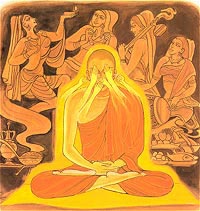
Verse 260. Grey Hair Alone Does Not Make An Elder
A man is not an Elder
though his head be grey,
he’s just fully ripe in years,
‘aged-in-vain’ he’s called.
Explanation:
One does not become an elder merely because one’s hair has turned grey.
One, who is only old in years, has grown ripe uselessly.
One does not become an elder merely because one’s hair has turned grey.
One, who is only old in years, has grown ripe uselessly.

Verse 261. The Person Full Of Effort Is The True Elder
In whom is truth and Dhamma too,
harmlessness, restraint, control,
he’s steadfast, rid of blemishes,
an ‘Elder’ he is called.
Explanation:
All things that men do arise out of the mind. The words and deeds of
men spring from their minds. Sometimes, their mind are blemished - evil.
If they speak or act with an evil mind, the inevitable result is
suffering. Wherever they go, this suffering will follow them. They
cannot shake off this suffering. This is very much like the wheel of the
cart that follows the steps of a draught bull yoked to the cart. The
bull is perpetually bound to it.
All things that men do arise out of the mind. The words and deeds of
men spring from their minds. Sometimes, their mind are blemished - evil.
If they speak or act with an evil mind, the inevitable result is
suffering. Wherever they go, this suffering will follow them. They
cannot shake off this suffering. This is very much like the wheel of the
cart that follows the steps of a draught bull yoked to the cart. The
bull is perpetually bound to it.
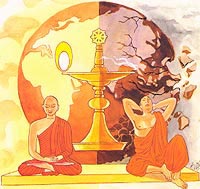
Verse 262. Who Gives Up Jealousy Is Good-Natured
Not by eloquence alone
or by lovely countenance
is a person beautiful
if jealous, boastful, mean.
Explanation:
Merely because of one’s verbal flourishes, impressive style of
speaking, or the charming presence, a person who is greedy, envious and
deceitful, does not become an acceptable individual.
Merely because of one’s verbal flourishes, impressive style of
speaking, or the charming presence, a person who is greedy, envious and
deceitful, does not become an acceptable individual.

Verse 263. Who Uproots Evil Is The Virtuous One
But ‘beautiful’ is called that one
in whom these are completely shed,
uprooted, utterly destroyed,
a wise one purged of hate.
Explanation:
If an individual has uprooted and eradicated all these evils and has
got rid of blemishes, such a person is truly an acceptable person.
If an individual has uprooted and eradicated all these evils and has
got rid of blemishes, such a person is truly an acceptable person.

Verse 264. Shaven Head Alone Does Not Make A Monk
By shave head no samana
if with deceit, no discipline.
Engrossed in greed and selfishness
how shall he be a samana?
Explanation:
Can an individual who does not practice religion, speaks untruth, and
is filled with desire and greed, become an ascetic, merely because he is
shaven-headed?
Can an individual who does not practice religion, speaks untruth, and
is filled with desire and greed, become an ascetic, merely because he is
shaven-headed?
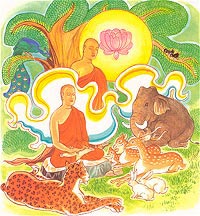
Verse 265. Who Give Up Evil Is True Monk
All evils altogether he
subdues both fine and gross.
Having subdued al evil he
indeed is called a ‘Samana’.
Explanation: If an individual were to quell all defilements, big and small, he is described as an ascetic - a samana.

Verse 266. One Is Not A Monk Merely By Begging Alms Food
Though one begs from others
by this alone’s no bhikkhu.
Not just by this a bhikkhu
but from all Dhamma doing.
Explanation:
No one becomes a monk merely because he begs others. An individual,
though begging , does not become a monk if he embraces vicious and
repulsive beliefs.
No one becomes a monk merely because he begs others. An individual,
though begging , does not become a monk if he embraces vicious and
repulsive beliefs.

Verse 267. The Holy Life Makes a Monk
Who both good and evil deeds
has gone beyond with holy life,
having discerned the world he fares
and ‘Bhikkhu’ he is called.
Explanation:
Who rises above both good and evil and treads the path of higher
discipline, reflecting wisely , that person, indeed, deserves to be
described as a monk.
Who rises above both good and evil and treads the path of higher
discipline, reflecting wisely , that person, indeed, deserves to be
described as a monk.
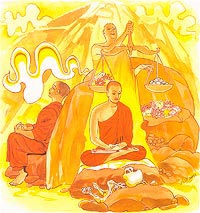
Verse 268. Silence Alone Does Not Make A Sage
By silence one is not a sage
if confused and foolish,
but one who’s wise, as if with scales
weighs, adopts what’s good.
Explanation:
The ignorant person, possessing foolish ways and seemingly bewildered,
may practice silence - the austerities of the munis. But this does not
make him a sage. But the wise person, like someone holding scales,
weighs good and bad and selects what is noble.
The ignorant person, possessing foolish ways and seemingly bewildered,
may practice silence - the austerities of the munis. But this does not
make him a sage. But the wise person, like someone holding scales,
weighs good and bad and selects what is noble.
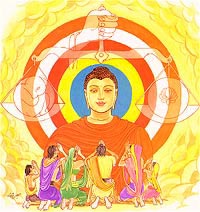
Verse 269. Only True Wisdom Makes a Sage
Shunning evil utterly
one is a sage, by that a sage.
Whoever both worlds knows
for that one’s called a ‘Sage’.
Explanation:
Weighing what is right and wrong, he shuns evil. For he is a sage
(muni). He is capable of weighing both worlds through his sagely wisdom.
Weighing what is right and wrong, he shuns evil. For he is a sage
(muni). He is capable of weighing both worlds through his sagely wisdom.

Verse 270. True Ariyas Are Harmless
By harming living beings
one is not a ‘Noble’ man,
by lack of harm to all that live
one is called a ‘Noble One’.
Explanation:
A person who hurts living beings is not a noble human being. The wise
person, who does not hurt any living being is called ariya, a noble
individual.
A person who hurts living beings is not a noble human being. The wise
person, who does not hurt any living being is called ariya, a noble
individual.

Verse 271. A Monk Should Destroy All Passions
Not by vows and rituals
or again by learning much
or by meditative calm
or by life in solitude.
Explanation:
These two stanzas are an admonition to the monks making an effort to
reach the state of blemishlessness - Nibbana. They are asked not to
slacken their effort to win liberation by
These two stanzas are an admonition to the monks making an effort to
reach the state of blemishlessness - Nibbana. They are asked not to
slacken their effort to win liberation by
being
content with some
achievement which only pave the way to the final goal.
achievement which only pave the way to the final goal.
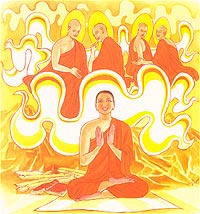
Verse 272. Blemishes Should Be Given Up To Reach Release
Should you, O bhikkhu, be content,
“I’ve touched the bliss of letting go
not enjoyed by common folk”,
though you’ve not gained pollution’s end.
Explanation:
Monks, do not rest content by precepts and rites. Do not be content
with extensive learning, Nor should you feel satisfied by achieving
states of mental trance. Do not rest content with seclusion, assuring
yourself “I have experienced the joy of renunciation not possible for
the ordinary.” Do not slacken your effort until you have attained
Nibbana.
Monks, do not rest content by precepts and rites. Do not be content
with extensive learning, Nor should you feel satisfied by achieving
states of mental trance. Do not rest content with seclusion, assuring
yourself “I have experienced the joy of renunciation not possible for
the ordinary.” Do not slacken your effort until you have attained
Nibbana.
youtube.com
The United Nations( chapter 19),My big book of Social Studies, class 5 complete explanation in Hindi
The United Nations( chapter 19),My big book of Social Studies, class 5 complete explanation in Hindi
Treasury of Truth (Dhammapada) Chapter 20, The Path

Verse 273. The Eight-fold Path Is Best
Of paths the Eight-fold is the best,
of truths the statement four,
the passionless of teachings best,
of humankind the Seer.
Explanation:
Off all paths, the eight-fold path is the greatest. Of the truths, the
greatest are the four noble truths. Detachment is the greatest of all
states. And, of all those who are two-footed ones, one who possesses
eyes. The Buddha is the greatest.
Off all paths, the eight-fold path is the greatest. Of the truths, the
greatest are the four noble truths. Detachment is the greatest of all
states. And, of all those who are two-footed ones, one who possesses
eyes. The Buddha is the greatest.
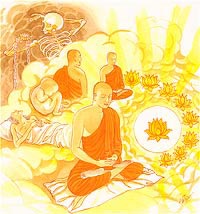
Verse 274. The Only Path To Purity
This is the path, no other’s there
for purity of insight,
enter then upon this path
bemusing Mara utterly.
Explanation:
This is the path. There is no other for the achievement of clarity of
insight. You must follow this path to the total bewilderment
This is the path. There is no other for the achievement of clarity of
insight. You must follow this path to the total bewilderment
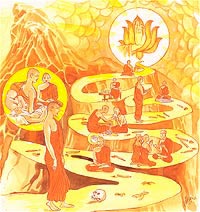
Verse 275. The Path To End Suffering
Entered then upon this path
you’ll make an end of dukkha.
Freed in knowledge from suffering’s stings
the Path’s proclaimed by me.
Explanation:
If you follow this path, you will reach the termination of suffering.
This path has been revealed by me, after the extraction of arrows.
If you follow this path, you will reach the termination of suffering.
This path has been revealed by me, after the extraction of arrows.
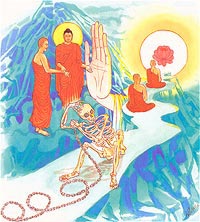
Verse 276. Buddhas Only Shows The Way
Buddhas just proclaim the Path
but you’re the ones to strive.
Contemplatives who tread the Path
are freed from Mara’s bonds.
Explanation:
The effort must be made by yourself. The Buddhas (the Teachers) only
show the way and direct you.Those contemplative meditators, who follow
the path, fully and totally escape the snares of death.
The effort must be made by yourself. The Buddhas (the Teachers) only
show the way and direct you.Those contemplative meditators, who follow
the path, fully and totally escape the snares of death.
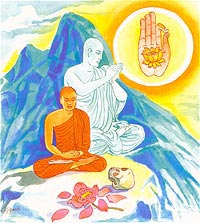
Verse 277. Conditioned Things Are Transient
When with wisdom one discerns
transience of conditioned things
one wearily from dukkha turns
treading the path to purity.
Explanation:
All component things, all things that have been put together, all
created things are transient, impermanent, non-constant. When this
realized through insight, one achieves detachment form suffering. This
is the path to total freedom from blemishes.
All component things, all things that have been put together, all
created things are transient, impermanent, non-constant. When this
realized through insight, one achieves detachment form suffering. This
is the path to total freedom from blemishes.

Verse 278. All Component Things Are Sorrow
When with wisdom one discerns
the dukkha of conditioned things
one wearily from dukkha turns
treading the path to purity.
Explanation:
All component things - all things that have been put together - all
created things are sorrow-fraught. When this is realized through
insight, one achieves detachment from suffering. This is the path to
total freedom from suffering.
All component things - all things that have been put together - all
created things are sorrow-fraught. When this is realized through
insight, one achieves detachment from suffering. This is the path to
total freedom from suffering.
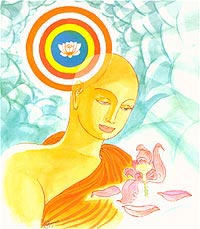
Verse 279. Everything Is Soul-less
When with wisdom one discerns
all knowables are not a self
one wearily from dukkha turns
treading the path to purity.
Explanation:
All states of being are without a self. When this is realized through
insight, one achieves detachment from suffering. This is the path of
total freedom from suffering.
All states of being are without a self. When this is realized through
insight, one achieves detachment from suffering. This is the path of
total freedom from suffering.

Verse 280. The Lazy Miss The Path
Though time to strive, not striving,
while young and strong yet indeed,
weak-minded and irresolute:
one finds not wisdom’s way.
Explanation:
If an individual does not make an effort even at a time when exertion
is due, if a person is lethargic even when he is young and strong; if a
person suppresses the wholesome thoughts that arise in his mind, if he
is lazy, he will not find the path to wisdom.
If an individual does not make an effort even at a time when exertion
is due, if a person is lethargic even when he is young and strong; if a
person suppresses the wholesome thoughts that arise in his mind, if he
is lazy, he will not find the path to wisdom.

Verse 281. Purify Your Thoughts, Words And Deeds
In speech ever watchful with mind well-restrained
never with body do unwholesomeness.
So should one purify these three kamma-paths
winning to the Way made known by the Seers.
Explanation:
If one is well-guarded in speech, well-restrained in mind, and if one
refrains from physical misdeeds, that person will certainly attain the
noble eight-fold path realized by the sages.
If one is well-guarded in speech, well-restrained in mind, and if one
refrains from physical misdeeds, that person will certainly attain the
noble eight-fold path realized by the sages.

Verse 282. Way To Increase Wisdom
From endeavour wisdom springs,
lacking effort wisdom wanes:
having known this two-fold path
either to progress or decline
so should one exhort oneself
that wisdom may increase.
Explanation:
From reflection and concentrated meditation refined wisdom arises.
Through the non-practice of concentrated wisdom erodes. Once these two
paths - one leading to progress and the other to decline - are
recognized, one must conduct one’s self to increased wisdom.
From reflection and concentrated meditation refined wisdom arises.
Through the non-practice of concentrated wisdom erodes. Once these two
paths - one leading to progress and the other to decline - are
recognized, one must conduct one’s self to increased wisdom.

Verse 283. Shun Passion
The wood cut down but not a tree
since it’s from wood that fear is born.
Having cut wood and woodedness
O bhikkhus be without a wood.
Explanation:
Monks, cut down the forest of defilements. But, do not cut down the
trees. Fear comes from the forests of defilements. Clear both the forest
and the undergrowth. Having done this achieve the state of Nibbana.
Monks, cut down the forest of defilements. But, do not cut down the
trees. Fear comes from the forests of defilements. Clear both the forest
and the undergrowth. Having done this achieve the state of Nibbana.

Verse 284. Attachment To Women
As long indeed as woodedness
of man to women is not cut
so long in bondage is one’s mind
as milch-calf to the mother cow.
Explanation:
As long as a man’s mind is attached to women, even minutely, like a
little undergrowth that has not been cut down, so long will his mind be
attached like a suckling calf to its mother cow.
As long as a man’s mind is attached to women, even minutely, like a
little undergrowth that has not been cut down, so long will his mind be
attached like a suckling calf to its mother cow.
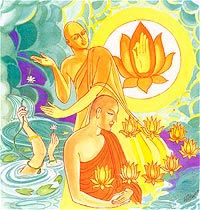
Verse 285. Path To Peace
Cut off affection for oneself
as a hand a lily in the Fall.
Cultivate this peaceful path,
Nibbana by the Buddha taught.
Explanation:
Just like a person plucking out a lily with one’s own hand, pluck out
your self-attachment. Cultivate the path to Nibbana, as advocated by the
Buddha.
Just like a person plucking out a lily with one’s own hand, pluck out
your self-attachment. Cultivate the path to Nibbana, as advocated by the
Buddha.

Verse 286. The Fear Of Death
Here shall I spend the Rains,
here the Winter, here the Summer.
Thus speculates the fool,
the danger he knows not.
Explanation:
In the four months during retreat, winter or summer in a chosen place,
the ignorant plans unaware of the threat of death.
In the four months during retreat, winter or summer in a chosen place,
the ignorant plans unaware of the threat of death.

Verse 287. Death Takes Away The Attached
For one who has a clinging mind
and finds delight in babes and herds
Death does seize and carry away
as great flood a sleeping village.
Explanation:
Men are proud that they process children, cattle and other forms of
wealth. They tend to be proud that way because their minds are overcome
with blemishes. Floods sweep away a sleeping village, taking along all
its people and their possessions. In the same way, death comes unaware
and sweeps along the people however proud they are of their possessions.
Men are proud that they process children, cattle and other forms of
wealth. They tend to be proud that way because their minds are overcome
with blemishes. Floods sweep away a sleeping village, taking along all
its people and their possessions. In the same way, death comes unaware
and sweeps along the people however proud they are of their possessions.

Verse 288. No Protection When Needed
No sons are there for shelter
nor father nor related folk,
one by the Death-king seized upon
in kin no shelter finds.
Explanation:
When and individual is gripped by death, sons cannot protect one. Not
even one’s father can shield a person from the grip of death. Nor can
one’s relations come to the rescue.
When and individual is gripped by death, sons cannot protect one. Not
even one’s father can shield a person from the grip of death. Nor can
one’s relations come to the rescue.
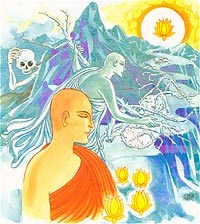
Verse 289. The Path To The Deathless
Having understood this fact
the wise by virtue well-restrained
swiftly then should clear the path
leading to Nibbana.
Explanation:
Being aware that no one can rescue you from death, the wise person, who
is restrained and disciplined, should clear the path to Nibbana,
without any loss of time.
Being aware that no one can rescue you from death, the wise person, who
is restrained and disciplined, should clear the path to Nibbana,
without any loss of time.








